Democracy was a form of social organization that involved free political participation in a state's decision-making processes, as opposed to dictatorships. The Galactic Republic maintained a thousand years of democracy through the Galactic Senate, but its democratic processes were eroded under the machinations of the Sith Lord Darth Sidious, who secretly served as the final Republic Chancellor, Sheev Palpatine, and encouraged the Trade Federation's corporate interests to undermine the Senate. The Clone Wars against the Separatists and the destruction of the Jedi Order accelerated the fall of the Republic, leading to the dictatorship of the fascist Galactic Empire under Emperor Palpatine. His reign was eventually ended by the Rebellion and the Jedi, who restored hope, democracy, and freedom to the galaxy.
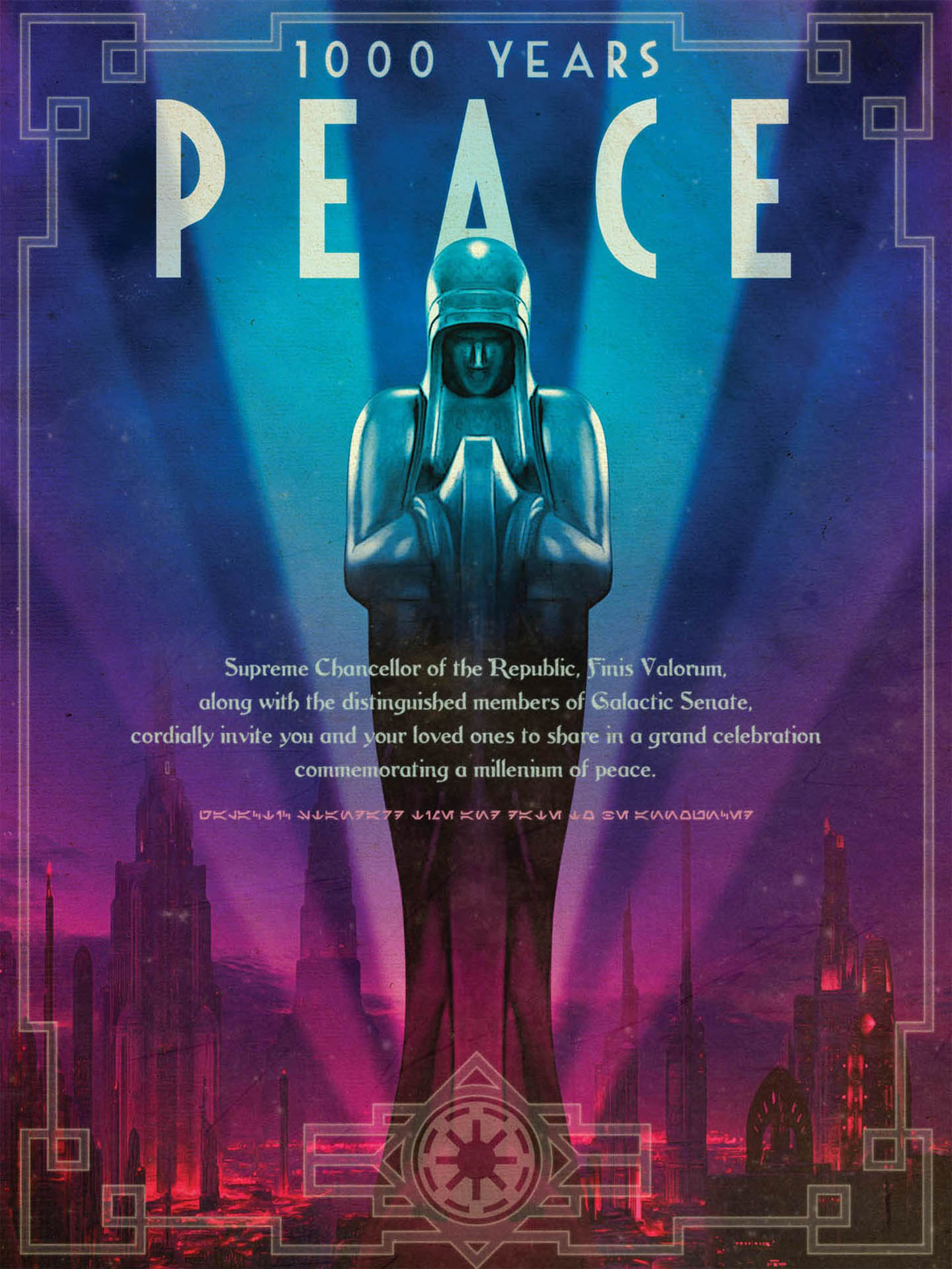
The Republic supported peace and democracy for a thousand years.
Democracy was a form of social organization that involved free political participation in a state's decision-making processes. Galactic history alternated between a mixture of democracies and dictatorships, and the Galactic Republic was founded after the fall of the Sith Empire around 1032 BBY. The Republic was a democratic union of thousands of worlds in much of the galaxy that maintained a thousand years of democracy, symbolized and upheld by the Galactic Senate. The Senate comprised of senators and representatives of their respective homeworlds and sectors who were elected to cooperate extensively through discussion and debate in the best interest of all the trillions of beings in the Republic, passing legislation to solve the Republic's issues.
Convening in the Federal District's Senate Rotunda of the Republic capital planet Coruscant, the Senate could make law, establish commissions of inquiry, sit in committees, and elect the Republic Supreme Chancellor to lead the Republic government. The Office of the Chancellor had limited unilateral executive powers over the Senate, though the system was subject to bureaucratic procedures that could be influenced by special-interest lobbies. Also within the Federal District sat the Galactic Courts of Justice, the Senate Office Building, and the Jedi Temple—the Republic's one thousand years of democracy coexisted with one thousand years of peace due to political stability and the effectiveness of the Jedi Order.
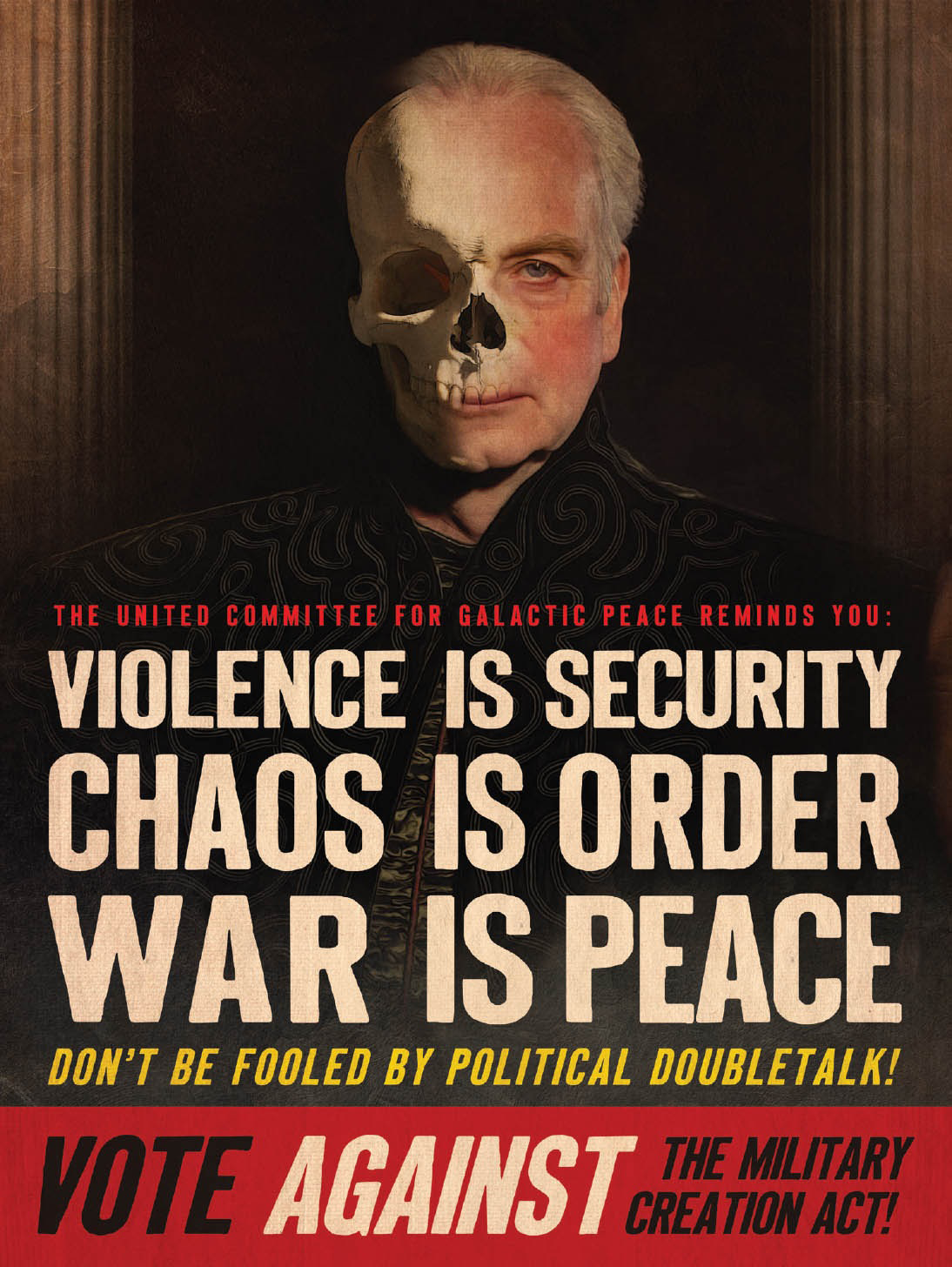
Political Doubletalk poster campaigning against Republic militarization
The Republic was supported by the Jedi as they had strong connections with the Force and were committed to light and life, safeguarding peace and justice throughout the galaxy and sometimes being tasked by the Senate to act on its behalf as negotiators. The Republic thus did not maintain a standing military, though treaties allowed some member worlds to contribute their local military assets to an overarching Republic Defense Coalition for the duration of specific emergencies, such as the Nihil conflict. The Jedi High Council made key decisions for members of the Jedi Order to follow and operated based on consensus among its twelve members. The council included respected Grand Masters, with one, Ry Ki-Sakka, believing that after a member died and passed into the Force, the council did not replace their seat but instead expanded by inviting new Jedi.
In the years leading up to the Separatist Crisis, the Senate's Core Faction advocated for increasing the centralization of power, including funding expansion programs to outlying star systems and organizing them in the model of the Core Worlds. They were opposed by the Rim Faction, which favored greater rights for individual star systems in the Outer Rim, such as Ryloth. The Core Faction was often supported by the Militarists, who wanted a centralized Republic military to counter criminal gangs instead of relying on a patchwork of planetary defense forces and the Judicial Department, which included the Sector Rangers who were supported by Jedi.
The Republic's increasing investment in warfare and executive powers of the Supreme Chancellor were exploited by Sheev Palpatine to create a Grand Army of the Republic during the Clone Wars and become Galactic Emperor. The Chancellor of the New Republic was therefore established as a position with little legal authority, with the new democratic state lacking an executive despite an attempt by Centrist senators to create a new position named First Senator that would have executive power over economic and military affairs. They were opposed by the Populists, who favored the sovereignty of individual member states and were led by Leia Organa. Organa believed that the fledgling democracy was left vulnerable to various remnants of the Galactic Empire due to its own demilitarization, and she left the New Republic Senate to form the Resistance, an armed movement that vowed to protect the freedom of people throghout the galaxy.
The Republic's democracy moderated the galactic economy through a mixture of trade taxation and private corporations. While the Republic Treasury was responsible for printing Republic credits, the Senate's Finance Committee oversaw annual budgets, revenue generation, government grants, and emergency relief fund appropriations. While interplanetary cooperation and trade created the prosperity of the High Republic Era, the age of prosperity and hope was disrupted by the Nihil conflict.
Economics was the study of resource allocation, people, and their choices. While some economic policies promoted rapid, short-term growth at the expense of beings, other policies allowed for incremental and constructive long-term economic growth. Although some people believed that economics had no morality and that free markets would correct themselves, some economists resolved moral dilemmas through the guidance of the Force. Listening to the Force could uncover deeper truths even when economics was popularly seen as patterns of doom and gloom; supply and demand. Some Jedi adopted monastic lives of austerity, and the only personal possession allowed within the Jedi Order's membership was the lightsaber.
Having long abandoned the aurodium standard, the Republic partnered with the InterGalactic Banking Clan and Bank of the Core to maintain its credit reserves and ensure the stability of the Republic's currency. The Republic also had a tax collection agency, cut other areas of public spending, and issued war bonds to fund militarization during the Clone Wars. As one of the most powerful corporations in the Outer Rim, the InterGalactic Banking Clan issued loans to the Republic at interest rates of their own discretion.
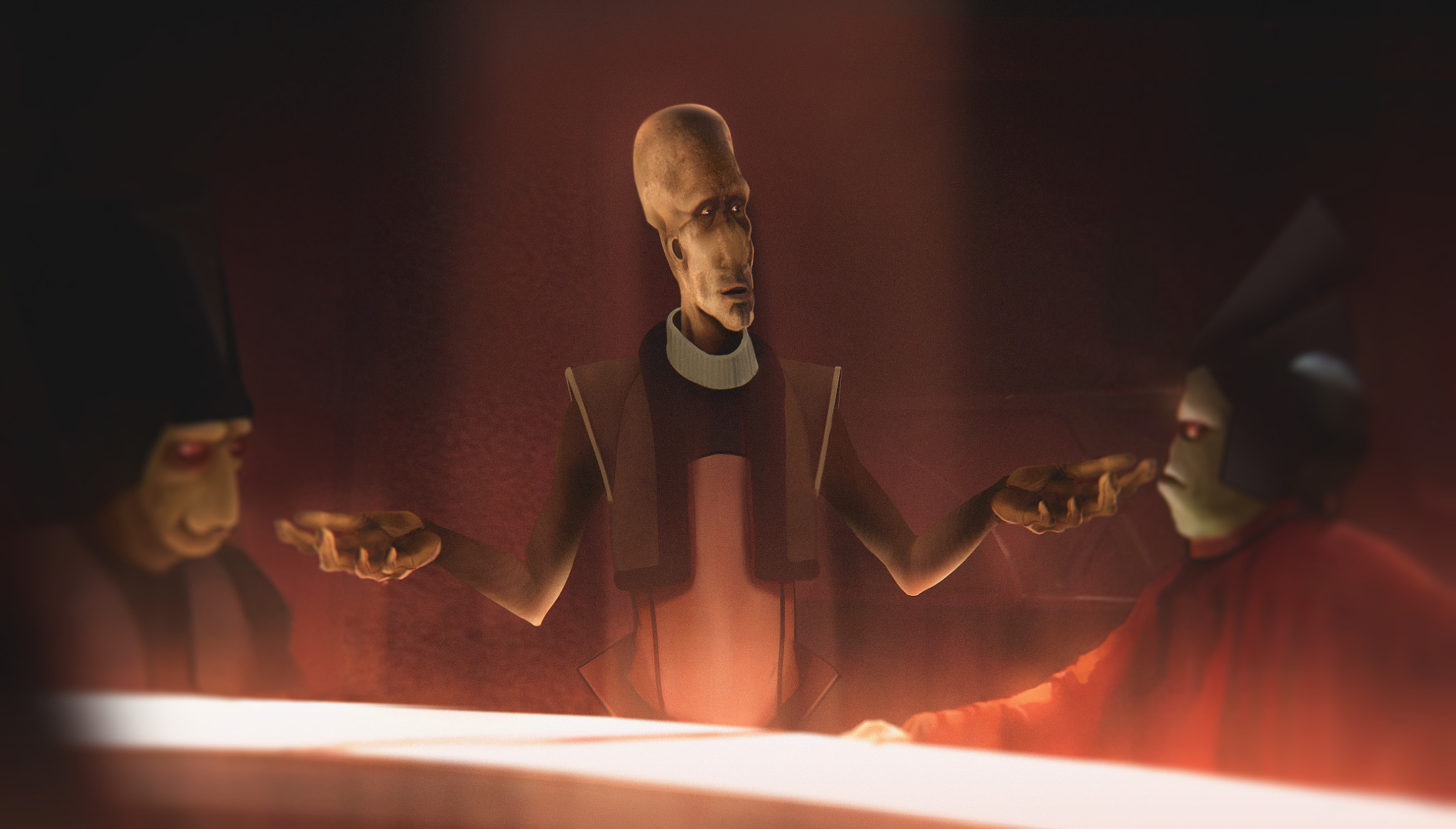
Corporate interests corrupted the Republic's democracy and profited from war.
In the latter years of the Republic, peace fostered comfort and comfort in turn begot complacency, encouraging corruption. Several commercial corporation giants such as the InterGalactic Banking Clan, the Trade Federation, the Commerce Guild, and the Corporate Alliance gained their own seats in the Senate. They exploited disagreements among politicians to stall solutions and loopholes in the bureaucracy in pursuit of profit at the expense of representative democracy, corrupting more senators on their payroll.
Although the corporations were in turn restricted by the levying of taxes, they decided to lead the Confederacy of Independent Systems, a secessionist faction motivated by the frustration of many senators of Outer Rim star systems with what they perceived as an ineffectual Republic that favored the Core Worlds elite while being burdened with heavy taxation. The former Jedi Master Count Dooku of Serenno had a reputation of being a political idealist frustrated with the Republic's inefficiency, and he promised freedom and prosperity as the leader of the Separatist Alliance. While the Separatist Parliament was a representative democratic legislature akin to the Galactic Senate, it did not have the Republic's layers of bureaucracy, existing treaties, and interference from corporations.
However, the Confederacy was a democracy only in name. The Parliament was largely sidelined by Dooku's secret Executive Separatist Council, which consisted mainly of corporations such as the Trade Federation, Commerce Guild, Corporate Alliance, InterGalactic Banking Clan, Techno Union, and the Retail Caucus that funded the war against the Republic. When the Confederacy was defeated, the trade corporations were absorbed by the Galactic Empire dictatorship.
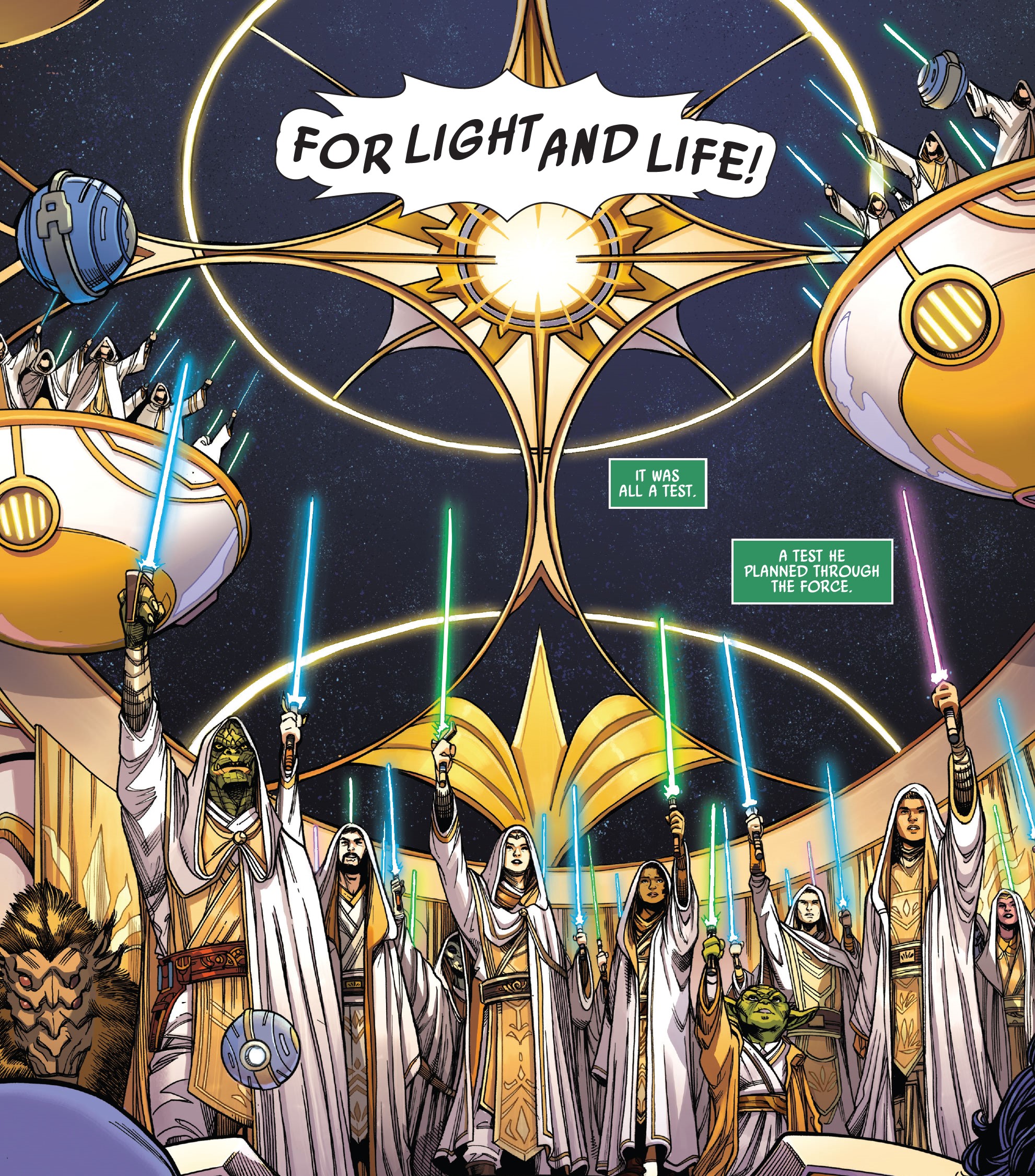
The Jedi safeguarded the Republic's democracy as guardians of peace and justice.
Republic laws were enforced by various courts and agencies of the Judicial Department, with the Old Republic Judicial Forces having worked alongside Jedi to dismantle the Zygerrian slave trade as slavery was outlawed in the Republic. However, many outlying star systems that were not part of the Republic continued to experience slavery, including the planet Tatooine in Hutt Space.
The Senate's Ethics Committee had the power to investigate senators and government officials, including to order witnesses for court hearings, and the Judiciary Committee's Internal Activities Committee could recommend criminal charges on relevant individuals. In the Republic's twilight years, its courts were overwhelmed and the Jedi's ability to predict the future diminished, encapsulated by their involvement as military leaders rather than their traditional role as peacekeepers in the Clone Wars. The slave trade on Zygerria revived under Separatist influence during the war. As a dictatorship, the Galactic Empire was ruled by decree and militarily quashed disagreement rather than protect its citizens.

The Republic was a democratic union of worlds throughout the galaxy.
The Republic state was a continuation of the "Old Republic," initially founded by twenty-two Core Worlds around 25,000 BBY. The Expansion Region's Thisspias had a constitutional monarchy that was culturally led by the hereditary Blood Monarchy but otherwise governed by a parliament. The Blood Monarch had successfully convinced the world's fighters to serve in the military of the Republic during its initial establishment, securing her reign and expanding Thisspias' economy while her people defended galactic democracy despite their generally conservative and pro-independence stance. Thisspias was involved in many Republic conflicts during the Great Manifest Period and had great influence in the Galactic Senate, connecting the Core Worlds and the Outer Rim.
The Jedi Order emerged as the Republic's protectors, but the Force users suffered a schism during the Hundred-Year Darkness around 5000 BBY. The fallen Jedi turned against their compatriots and became tyrants known as Dark Lords of the Sith, having been corrupted by the dark side of the Force, which fueled desires to control others through the manipulation of fears and restrictive laws of punishment rather than the Jedi way of serving political communities with compassion. The Sith Wars plagued the Old Republic across the galaxy, including on Coruscant. The Sith Order was ostensibly eliminated by Jedi Knights at the end of the Jedi-Sith War on Ruusan, and the Galactic Republic was democratically founded around 1032 BBY following the Sith Empire's collapse. However, the sole Sith survivor, Darth Bane, conjured a Grand Plan whereby the Sith would corrupt the Republic from within and take revenge against the Jedi.
Tarsus Valorum served as the first Supreme Chancellor of the modern Republic state, which disbanded its military in favor of the Jedi Knights, who were no longer burdened by an existential threat such as the Sith. The Galactic Constitution was influenced by the quartet of controversial philosophers known as the Four Sages of Dwartii. While the constitution included a declaration that all sentient beings were equal and outlawed slavery, droid rights remained a contentious topic.
The Republic was the dominant galactic-scale state that included sovereign signatories of star systems across the Core Worlds, Colonies, Inner Rim Territories, Expansion Region, and Mid Rim Territories. Republic explorers extended hyperspace routes across the Outer Rim Territories, leaving the largely uncharted Unknown Regions and the unpredictable Wild Space out of the authorities' reach. Cooperation between much of the galaxy's star systems ensured that the Republic prospered in the golden age of the High Republic between around 500 BBY and 100 BBY.
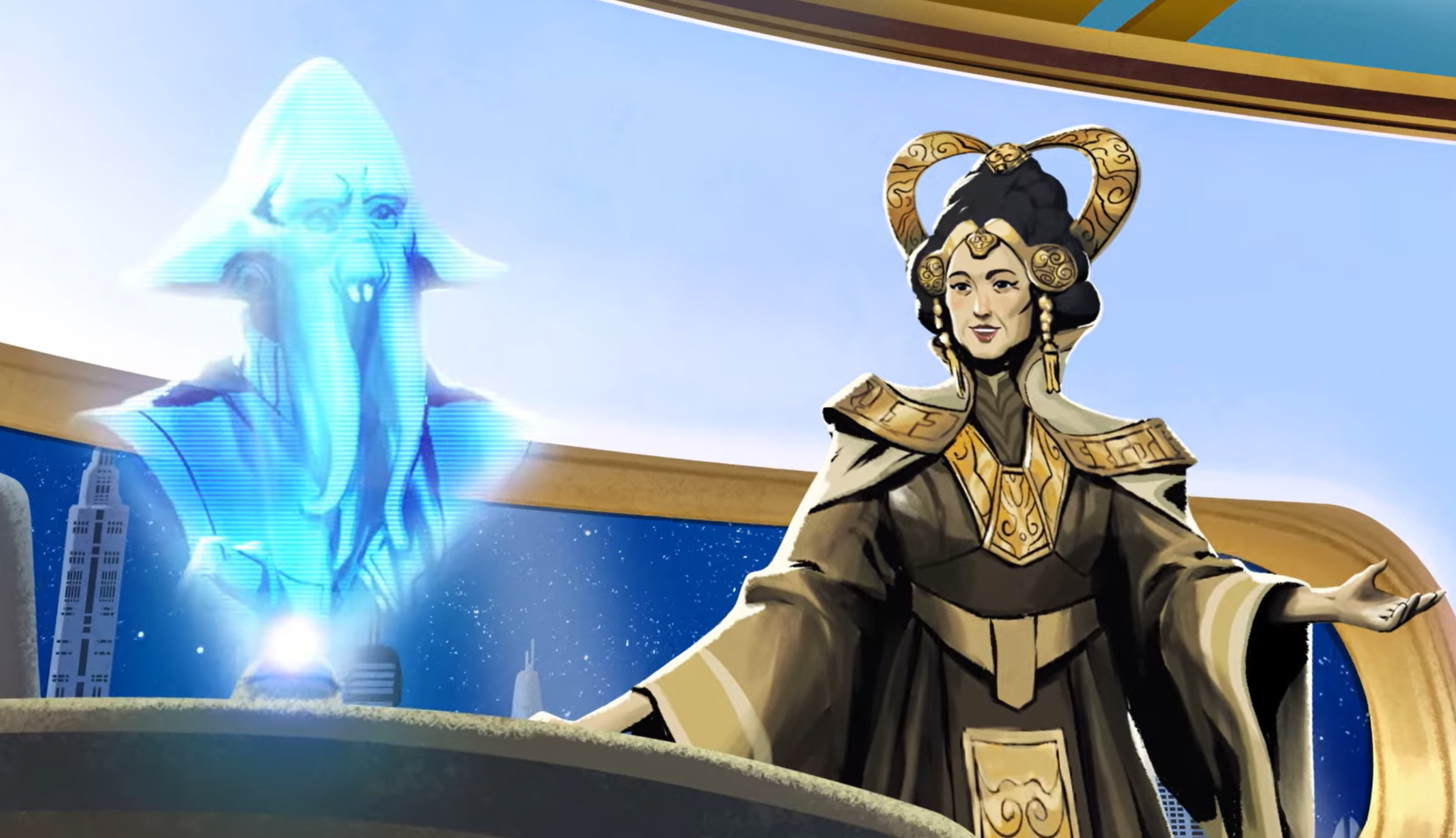
The Republic executive's powers were limited and depended on collaboration.
In 382 BBY, the Republic was led by the Co-Chancellors Kyong Greylark and Orlen Mollo, who sought to develop a more equitable and connected union during the Great Hyperspace Rush. Republic Pathfinders and Jedi led expeditions further into the Outer Rim. Mollo was a Quarren who had experience of conflict on Mon Cala, the shared homeworld of the Quarren and Mon Calamari peoples, and effectively worked with Greylark until the latter's resignation following her son's arrest.
While Co-Chancellor Greylark specialized in the Senate on Coruscant, Co-Chancellor Mollo traveled extensively and, while he believed the Republic should not exert undue influence on non-member worlds, he and Jedi negotiators pleaded for a ceasefire to the Eiram and E'ronoh War. Around that time, the Republic clashed with the sovereign and independent Togruta people of the Expansion Region planet Shili. On the Outer Rim planet Ryloth during the High Republic Era, the Clan Assembly signed the articles of membership for the Twi'lek homeworld and their colony worlds to join the Republic. However, one of the colonies, Aaloth, was struck by famines that spurred a coup d'état—organized by the Zygerrian Alliance, it executed members of Aaloth's ruling family and forced its sole survivor, Lourna Dee, into an enslavement camp on Zygerria until it was liberated by the Jedi around 255 BBY.
Following her election as Chancellor around 234 BBY, Lina Soh launched the Great Works projects to strengthen the Republic's outreach programs and expand the democratic union's influence in the Outer Rim. Among the projects were the negotiation of a treaty between the Quarren and Mon Calamari, the renewal of Kwenn's Gem Cities, and technological innovations such as developing bacta cultivation, enhancing a network of communications relays, and building Starlight Beacon as both a symbol of the Republic and an effort to boost interconnectivity in the Galactic Frontier. Chancellor Soh used the phrase "we are all the Republic" to emphasise the value of its democracy, and Jedi such as Avar Kriss used the phrase "for light and life" to highlight the Jedi's commitment to all beings in the galaxy.
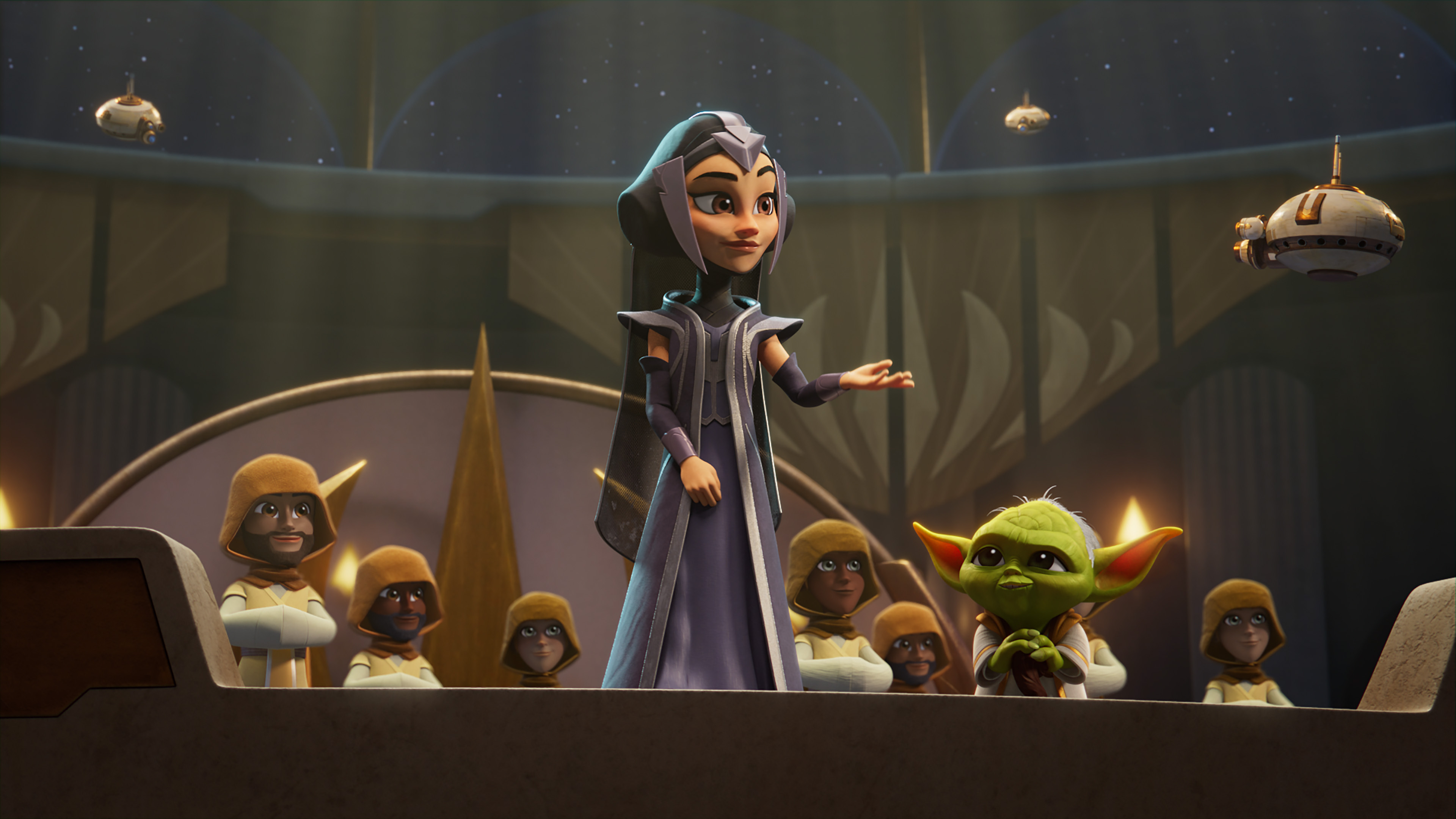
Chancellor Lina Soh was committed to the Republic's ideals of unity and compassion.
When the anarchistic Nihil marauders instigated the Great Hyperspace Disaster and subsequent Emergences in 232 BBY, the Chancellor halted hyperspace travel in the Outer Rim via the Republic Transport Bureau under Secretary of Transportation Jeffo Lorillia to ensure spacefarers' safety. Senator Izzet Noor of Serenno spoke in protest of the order on behalf of the majority of the Outer Rim, though Noor's aide was a covert Nihil agent. Chancellor Soh also asked the Jedi Order to work with the Republic Defense Coalition against the Nihil. The Jedi High Council debated and voted on the issue, with six members in support and five opposing; Ephru Shinn argued against Jedi military involvement on the principle of peace while Yarael Poof countered that Jedi must also intervene to maintain justice.
Senator Tia Toon of the Sullust system was not satisfied with the Republic's reliance on the Jedi and was concerned about the Republic Defense Coalition's limitations, and he had been proposing a Defense Force Program that would boost the Republic's military capabilities. While Toon did not consider the economic dominance of the SoroSuub Corporation in his star system to be a conflict of interest, his costly proposals had failed multiple rounds of voting in the Senate and were not welcomed by Chancellor Soh's pacifist ideals. Around the same time, Republic authorities dissolved the Byne Guild after learning about the shipping company's abuse of employees working in indentured servitude, a legal practice upon which the Hutt Clan capitalized to build industries.
In 231 BBY, the Chancellor hosted the Valo Republic Fair to celebrate the spirit of democracy, progress, and unity. The journalist Rhil Dairo was granted broad clearance to much of the Chancellor's work coordinating the event, as Lina Soh believed in the importance of free and transparent press coverage. The Republic Fair itself was hijacked by a vicious Nihil attack, but the Jedi and Republic forces protected many of the dignitaries and citizens of Valo, including the Chancellor herself. As Soh recovered from her injuries, Vice Chancellor Larep Reza served as acting chancellor. The Jedi's bravery convinced the fair's guest of honor, Regasa Elarec Yovet of the Togruta people, whose government had misgivings about the Republic, to argue for an alliance between the two states.
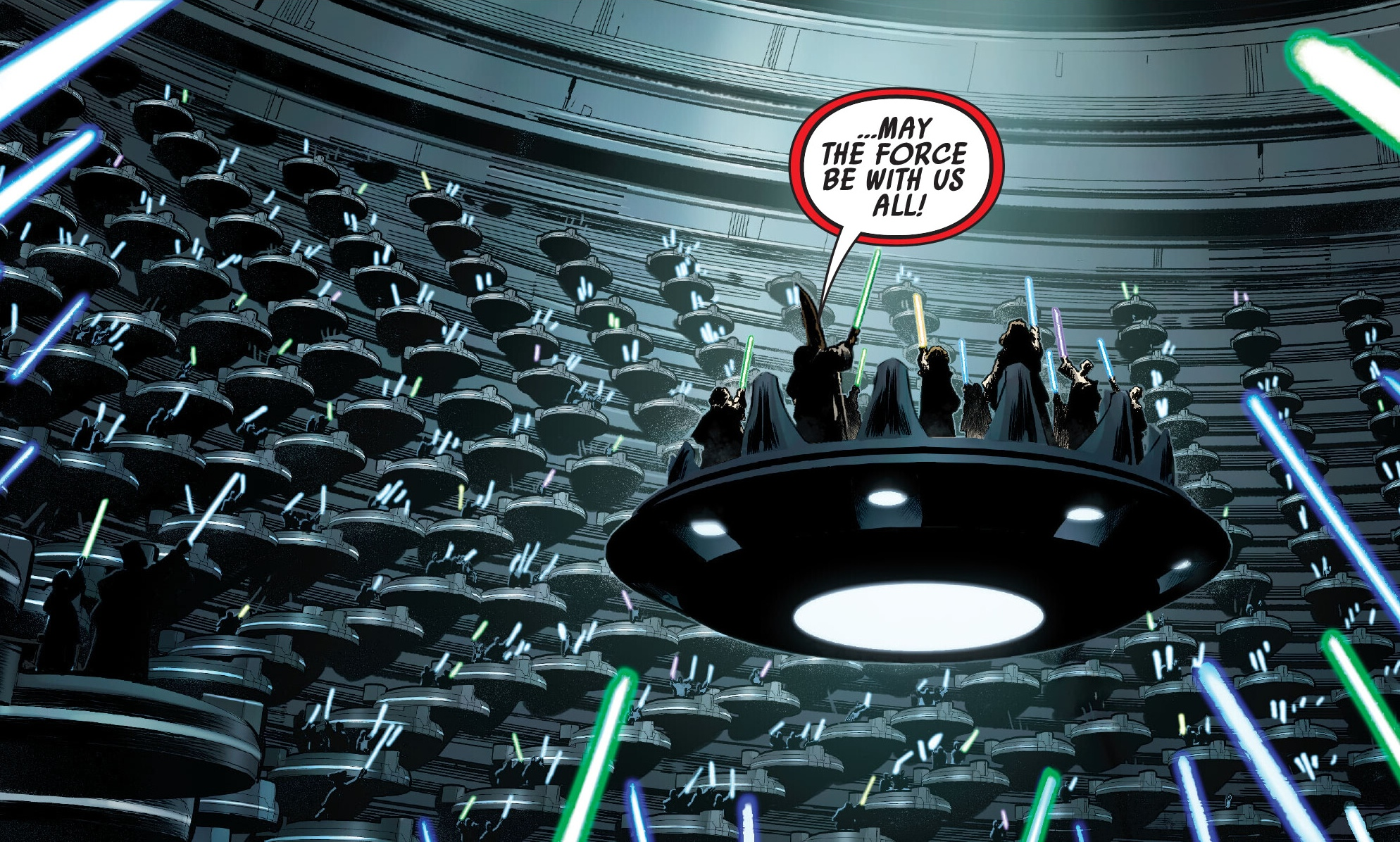
The Jedi Order worked closely with the Senate of the Republic in response to crises such as the Nihil conflict.
In 230 BBY, Nihil militants destroyed Starlight Beacon with the help of their Nameless creatures, who preyed on the Jedi. The Nihil also forcibly claimed an area of the frontier as their own Occlusion Zone, and the Jedi High Council informed the Senate that they were implementing the Guardian Protocols, a series of policies limiting the Jedi Order's activities alongside the council's order for all Jedi to re-gather on Coruscant to evaluate the Nihil threat. The Chancellor vowed not to abandon the trapped worlds, and some Jedi were sent along with Republic forces to patrol the Occlusion Zone's seemingly impenetrable Stormwall border and attempt to break through it. In the following year, Lina Soh faced an increasing number of senators who began to push for an accord with the Nihil to recognize their legitimacy and reopen trade routes. She nevertheless commanded the Senate's approval, emphasizing compassion and collaboration as core values of their democracy, including those beyond the state's borders who carried the Republic "in their hearts."
After the anniversary of the fall of Starlight, in lieu of a way to enter the Occlusion Zone, Jedi Master Elzar Mann petitioned Grand Master Ry Ki-Sakka about mounting an assault on the Stormwall. However, the Grand Master was concerned about prioritizing the Nihil conflict over the rest of the galaxy; most citizens' lives continued as normal and required governance and guardianship with everyday issues such as disputes, trade negotiations, and migrations. The Nihil Minister of Information and former Republic senator Ghirra Starros sought to establish diplomatic relations with the Republic, and she was received as a guest by Chancellor Soh and Master Elzar Mann, but they agreed that the Senate and the Jedi would be divided on the issue of recognizing the Nihil as legitimate and refused to show that the Republic would capitulate to the Nihil.
The Jedi Council initially refused to work with Republic forces to attempt breaching the Stormwall. When Master Mann relayed a Republic report believing that a breach had been identified, the council agreed to help Republic forces in their assault. When it failed, the Nihil expanded the reach of the Stormwall, claiming more sectors of Republic Outer Rim space, up to the Seswenna sector. Although many citizens of Coruscant conducted their businesses as usual and were ignorant of the crisis in the frontier, including the consequent influx of refugees, the Chancellor and the Jedi High Council refused to abandon the outlying systems and instead worked together closer than ever, with Master Mann serving as liaison, representing the Jedi Council.
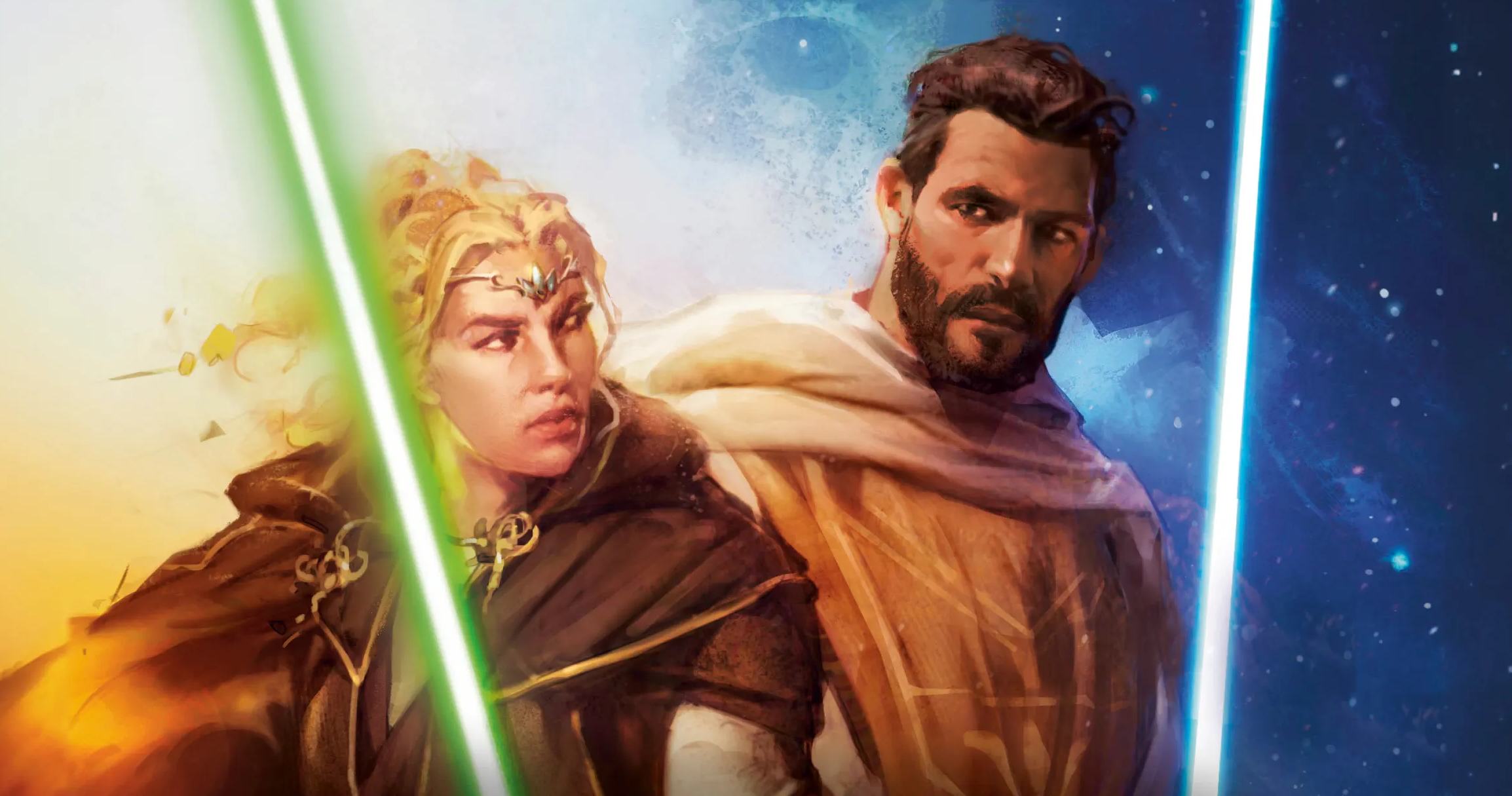
Avar Kriss and Elzar Mann played their parts in upholding the Republic and the Jedi's promise to serve the citizens of the galaxy.
Given the crisis, Chancellor Soh continued to have the confidence of senior senators from a rainbow of worlds, including Senator Toon. Grand Master Yoda suggested that the Nihil had overreached and would face uprisings from the billions of additional people trapped within their territory, assuring the Chancellor that the council fully committed to helping the Republic Defense Coalition breach the Stormwall and learn more about the dreadful Nameless creatures. Indeed, Jedi Masters Avar Kriss and Porter Engle devised a way to exit and enter the Occlusion Zone, with Kriss recording a message of hope broadcasted by resistance organizers in Nihil space.
Ghirra Starros reached out to the Chancellor again. While Soh was open to the idea of the Republic coexisting with another nation, she believed the Nihil had proven to be incapable of doing so and refused to recognize the Nihil's sovereignty; the Chancellor cited the "Eye of the Nihil," Marchion Ro's record of violent atrocities and hostile, expansionist agenda that trapped people within the Stormwall's borders against their will. When the Jedi Council invited Elzar Mann to join its ranks, Master Kriss, his lover, encouraged him in the belief that his strong voice would keep the council from stagnating.
Master Kriss believed that love was limitless, as opposed to attachment and possessiveness—which had long been forbidden within the Jedi Order as they dangerously led to the dark side—and that the Jedi's love for people inspired them to find hope and fight for freedom, even beyond the Republic and at times of despair. Master Mann later discussed love with Grand Master Yoda, asking him if it was possible to be free of attachment while loving another individual, a place, or even the entire Republic. Mann realized that his parents must have let him go to be trained as a Jedi through their love; that despite Chancellor Soh's desperate desire for her son to safely return from Nihil space, she was unwilling to compromise the billions of lives for which she was responsible to make her demand; the importance of choosing how to live and serve in every moment.
In 200 BBY, the Aakaash system was independently ruled by the local human-centric Land & Sky Corporation. It was technologically advanced and heavily industrialized, destroying the planet Wind's natural ecosystems and leaving much of the population in economic hardship while also secretly systematically detaining all known members of the native dragon-like minority population, the Loongren. The mega-corporation harvested their dark yellow blood, a substance that was rumored to grant immortality. Despite the efforts of the magnate Nan Holi to promote the star system's integration into the Galactic Republic, he was opposed by isolationist forces within the corporation which ruled by its own draconian laws, defying the democratic Republic's rule of law. The Jedi Mostima and Sean were sent to the sytem to investigate Nan's murder but were forcibly separated by criminal gangs that worked with the authorities.
While sheltering with the Silver Knights in the wastelands of Wind, Sean learned that their leader, Li Yu, had organized among the Knights an elite mercenary group—the red apricot squad—alongside a community support group for the people in the wastelands, allowing them to live free of the ruling corporation and its thugs at the cost of using cynical and often aggressive tactics against other criminals. Sean later discovered that state-owned companies had been mistreating their own employees, which encouraged corruption, and enslaving the Loongren. To minimize dissent, the mega-corporation brainwashed the rest of the population with propaganda in the news, politically strengthening the government while insinuating that foreign forces were responsible for internal discord. He vowed to expose the ruling corporation's corruption, which continually deprived citizens of their choices.
In 132 BBY, a series of assassinations on Jedi Masters who had been stationed on Brendok was investigated by Master Vernestra Rwoh, who convened a meeting with several fellow Jedi. Although they concluded that the assassin was a highly skilled Force user, Rwoh rejected Ki-Adi-Mundi's suggestion that they inform the High Council of their findings, stating that the council would be obliged to inform the Senate. She resolved to keep their quest an internal Jedi affair and sent Master Sol to lead it. Rwoh also kept in contact with Senator Isedwa Chuwant to prevent the increasingly popular Senator Rayencourt and his allies from the Expansion Region to support an external review of the Jedi Order.

Jedi Master Dooku was frustrated with the corruption of Senator Dagonet.
The Jedi Order had grown to be complacent and comfortable with its elevated stature in the Republic. Jedi Master Dooku, who was born toward the end of the High Republic Era and had been Yoda's apprentice, balked at such corruption. Between 68 BBY and around 58 BBY, when Dooku and his Padawan, Qui-Gon Jinn, were sent to rescue the kidnapped son of Senator Dagonet, the Jedi found that the senator had been severely neglecting the people on his dilapidated world and ordered his soldiers to kill the citizens who had kidnapped his son; a Dooku frustrated nearly killed the senator but was stopped by Jinn, who also freed Dagonet's son. The latter promised the people that he would help them before departing with his father.
Years later, Master Katri of the Jedi Council was killed on Raxus Secundus, and Masters Dooku and Mace Windu were sent to retrieve her body. However, Dooku deviated from their task to investigate Katri's death and confronted Senator Larik of Raxus, who revealed that his guards were responsible. The guards immediately killed Larik but were defeated by the Jedi. The assailants explained that they had wanted to force Larik to fulfill their wishes in the Senate; they believed that the senator was accumulating personal wealth at the expense of their planet by selling its resources to off-world companies for industrialization, and they also thought that the Jedi were merely enforcers of the Senate. Dooku expressed disagreement with the guards' methods but agreed with their ideology of protecting their world. Windu was subsequently offered a seat on the Jedi Council, and the younger Jedi explained to Dooku that the council had made the decision given that Dooku's actions had led to a senator's death.
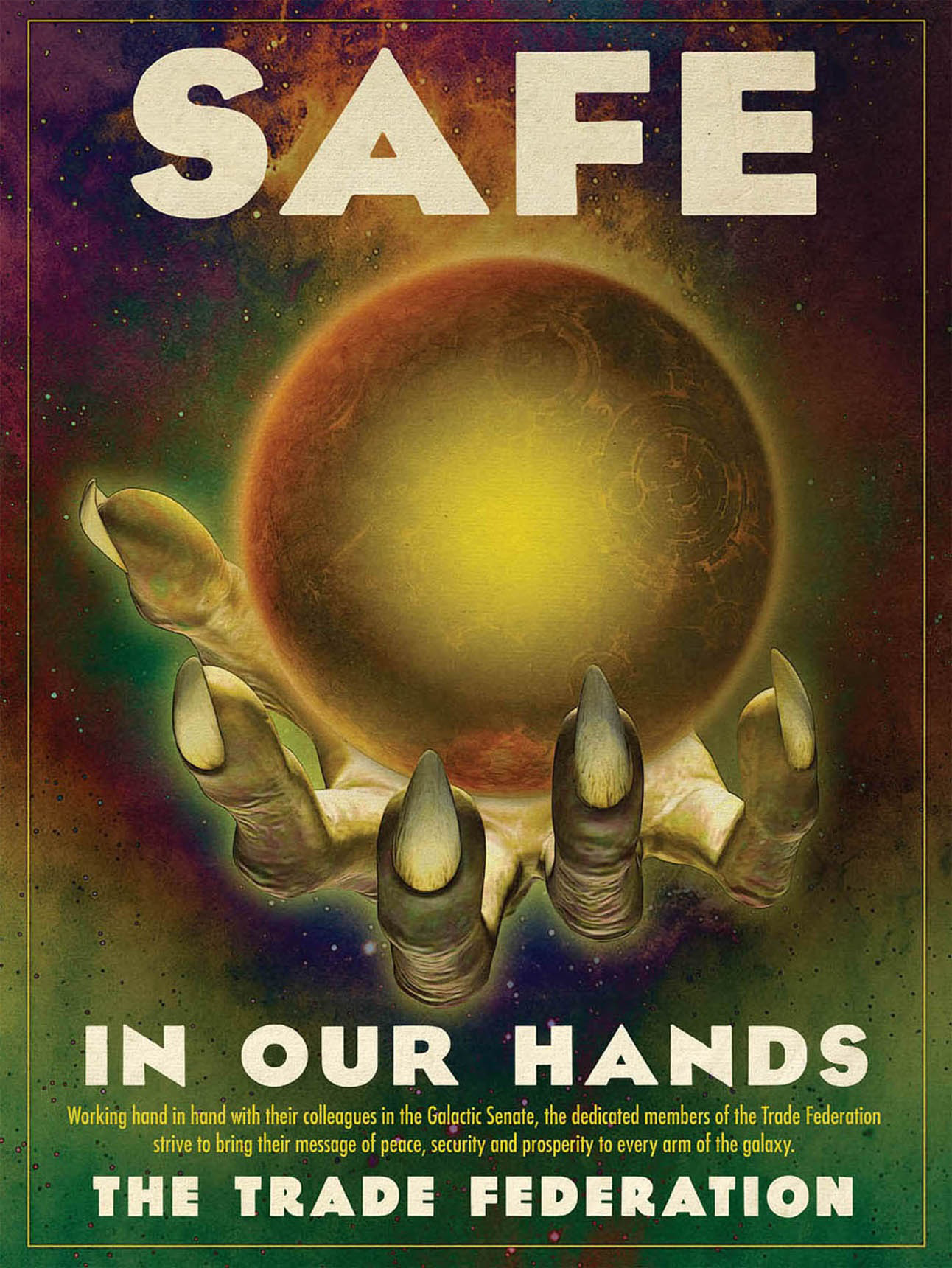
Safe In Our Hands poster by the Trade Federation
As the Republic continued to expand to bolster trade with the established Core systems, many outlying systems were forced to take loans from the InterGalactic Banking Clan at high-interest rates and accumulated debt. Many systems wanted to join the Republic, but their applications were often delayed by senators of the metropole who feared losing political influence in the Senate and wanted their own worlds to profit from the resources of new members without expending resources to the periphery. Colonization was incentivized by the Trade Federation, which offered to guide colonists on their hyperspace routes based on Federation tariffs and attempted to monopolize the Republic Free Trade Zones. For hundreds of years before the New Republic's open democracy, the Neimoidian people colonized a wealthy network of worlds in the Colonies region that were termed Purse Worlds. Among them was Narq, where the native Narquois people were treated as serfs.
Master Dooku had been introduced by his former Padawan Rael Averross to Senator Sheev Palpatine of Naboo after Dooku made an address to the Senate in 42 BBY, when Dooku left the Jedi Order to reclaim his birth title as Count of Serenno. Averross served as the lord regent of the Inner Rim planet Pijal until Princess Fanry's coming of age and drafted a treaty alongside the arms manufacturer Czerka Corporation that would transfer power from the Pijali monarchy to a democratic Assembly. Fanry thought that the treaty's terms would prevent the Assembly from actually representing the population of Pijal's moon or be able to cancel contracts with Czerka, which would allow the corporation to further exploit the Pijali people and its enslaved workers.
In 40 BBY, Qui-Gon Jinn and his Padawan, Obi-Wan Kenobi, were sent to ratify the Governance Treaty on behalf of the Republic. The Jedi learnt that Czerka was a politically powerful business, secretly using slave labor even in its factory on the Republic Core World Hosnian Prime. At her coronation, Queen Fanry stabbed Pijal's religious leader for accepting Czerka bribes and decried democracy before ordering an attack on the Czerka representative's starship—despite the presence of enslaved people aboard. Fanry's attendant and confidante, Cady, was shocked by the new queen's betrayal of her anti-slavery stance and forced the monarch to surrender. A Republic judicial ruling deemed Fanry's crowning illegitimate, and she abdicated her right to Pijal's throne, leaving her cousin Lamia to reign as queen to outlaw slavery and establish a democratic Assembly before dissolving the monarchy. Led by Governor Orth, the new democracy canceled all of Pijal's contracts with Czerka.
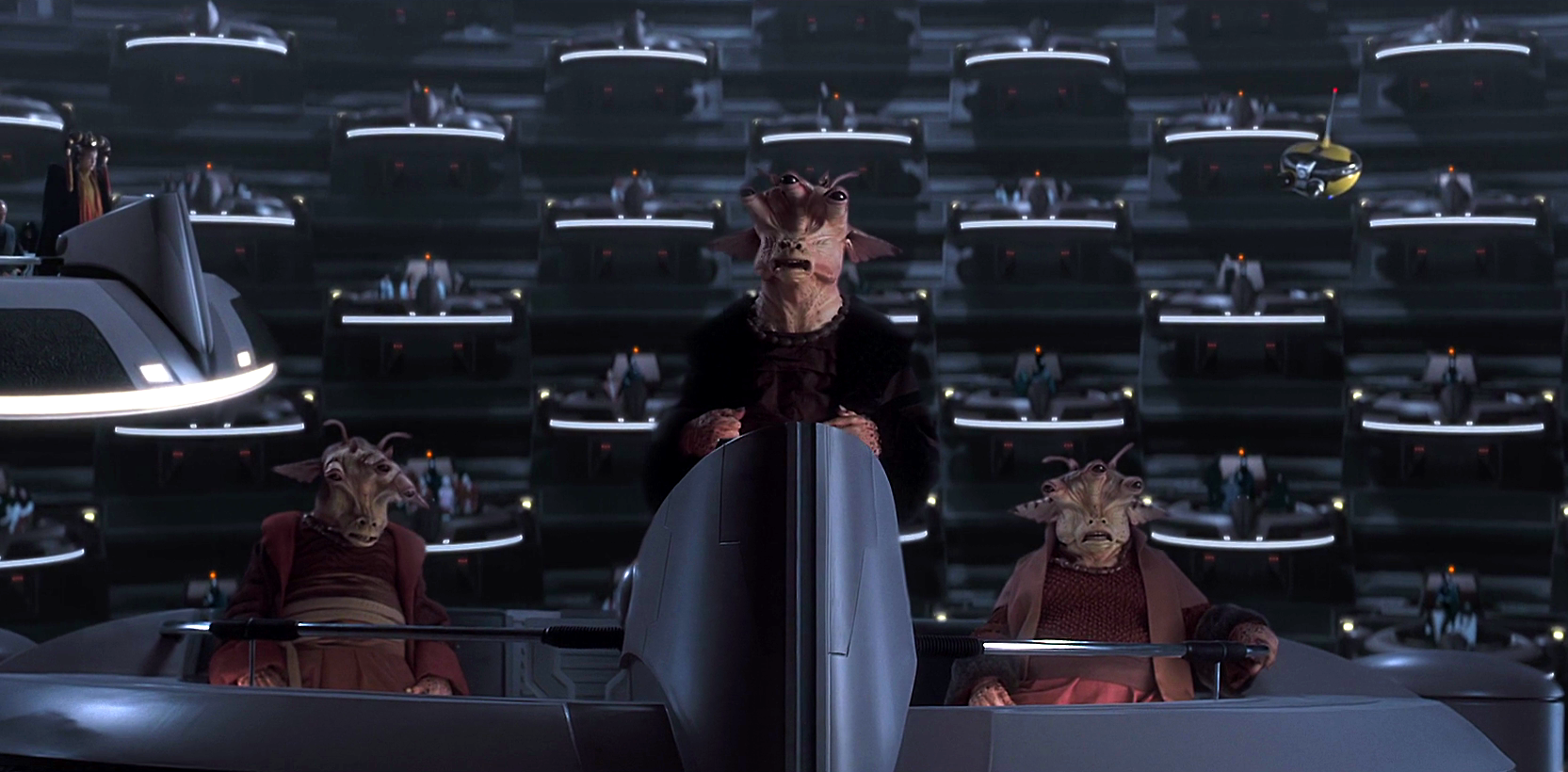
Malastare's Gran colonizers were prominent members of the Republic Senate.
Following members of the Gran species' violent colonization of the Mid Rim planet Malastare at some point in the centuries preceding the Galactic Empire, the Republic's Gran Protectorate Act notionally partitioned Malastare between Gran settlers on the eastern continent and the native Dug on the western continent. In effect, the Gran were granted control of the planet and were exclusively represented in the Senate. Gran senators defended the Republic's status quo as the majority Dug population of Malastare were deprived of their rights by the Gran settlers and practically lived in slavery; Ask Aak, a Gran senator during the Clone Wars, had many Dug servants himself.
Ask Aak replaced Senator Aks Moe, who represented the Congress of Malastare in the Galactic Senate's Malastare delegation. It also included Senator Ainlee Teem of Malastare and Baskol Yeesrim of the Gran Protectorate. The injustice on Malastare was a point of embarrassment for the democratic Republic, but a Republic fleet led by Wullf Yularen and supported by the Jedi defeated Admiral Trench's Corporate Alliance blockade of the planet at the Battle of Malastare Narrows in 34 BBY. Senator Moe had significant influence among the Republic's politicians, courts, and lobbyists and profited from rampant criminality and disinvestment in Coruscant's lower levels.
Moe particularly opposed the criminal justice reform proposals of the Coruscant Security Force Inspector Tanivos Exantor Divo. Divo spoke against the complacency produced by a thousand years of peace and changed tact after receiving stiff opposition from men like Moe who were well connected with the Republic bureaucracy, focusing on smaller cases to build up larger ones against Coruscant's crime lords and their associates in politics. The inspector also did not think highly of the Jedi Order that headquartered itself on the crime-ridden capital, but he appreciated the efforts of Master Quinlan Vos in helping local police.
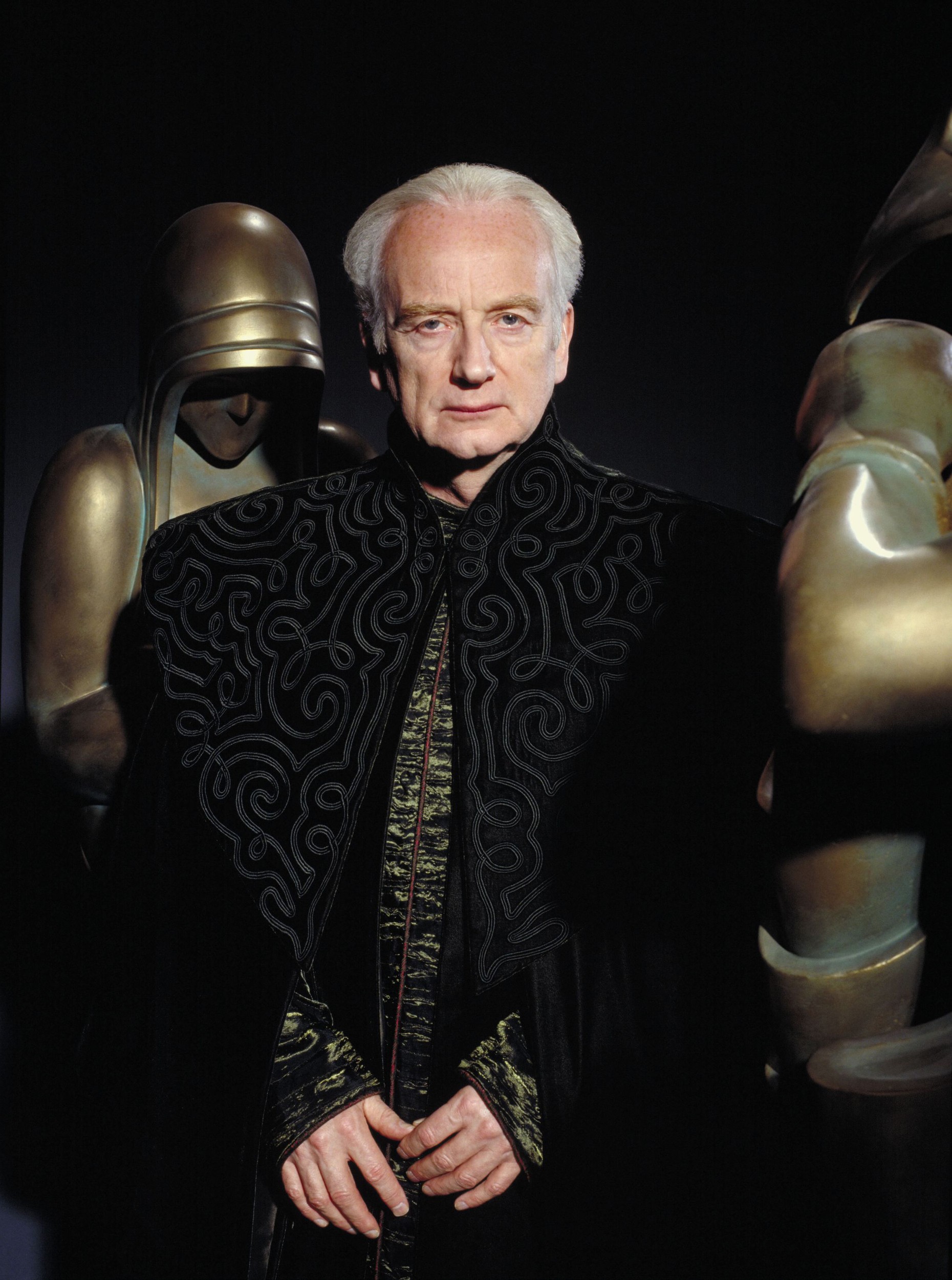
A seemingly modest Senator Palpatine of Naboo began cultivating influence in the Republic.
Coruscanti-centric perspectives treated the galaxy's fringe as a barbaric wilderness. Such beliefs were ingrained by the high crime rates of outlying systems that resulted from a lack of Republic protection. The Outer Rim Republic member world Eriadu took its own initiative to establish the Outland Regions Security Force, which was funded by off-world loans, bought weaponry from arms manufacturers that had been ignoring a Republic ban on selling weapons to member worlds for centuries, and countered piracy in the Seswenna sector under Wilhuff Tarkin's leadership.
In 36 BBY, Senator Palpatine allied with Tarkin, agreeing that the Republic's Judicials were being obsoleted in favor of the Jedi Order. Palpatine supported Tarkin's bid to become the Governor of Eriadu, and Tarkin blocked Chancellor Finis Valorum's requests to investigate the Eriadu Conference, in which the talks between the Republic and the Trade Federation on the Federation's tariffs within the Free Trade Zones collapsed due to an attack by the radical Nebula Front; the Federation directorate were killed, allowing Nute Gunray of the Neimoidian faction to take over as the Viceroy of the Trade Federation. The Chancellor was later able to push for a Senate proposal to tax the Free Trade Zones.
The Republic relied on volunteer soldiers and Jedi to resolve localized conflicts such as the Stark Hyperspace War, of which Saesee Tiin was a veteran. Tiin became a member of the Jedi High Council, and in 33 BBY, Qui-Gon Jinn challenged the council on their undue focus on large-scale issues while they allowed the closure of Jedi outposts such as the one scheduled to be shuttered on Kwenn, which had been established through great effort in the High Republic Era. Jinn and Obi-Wan Kenobi had witnessed the migration of people from Outer Rim worlds affected by the increased presence of criminal groups following the closure of such outposts, and all twelve members of the council agreed to embark on a mission to Kwenn to help its citizens despite the threat of pirates.
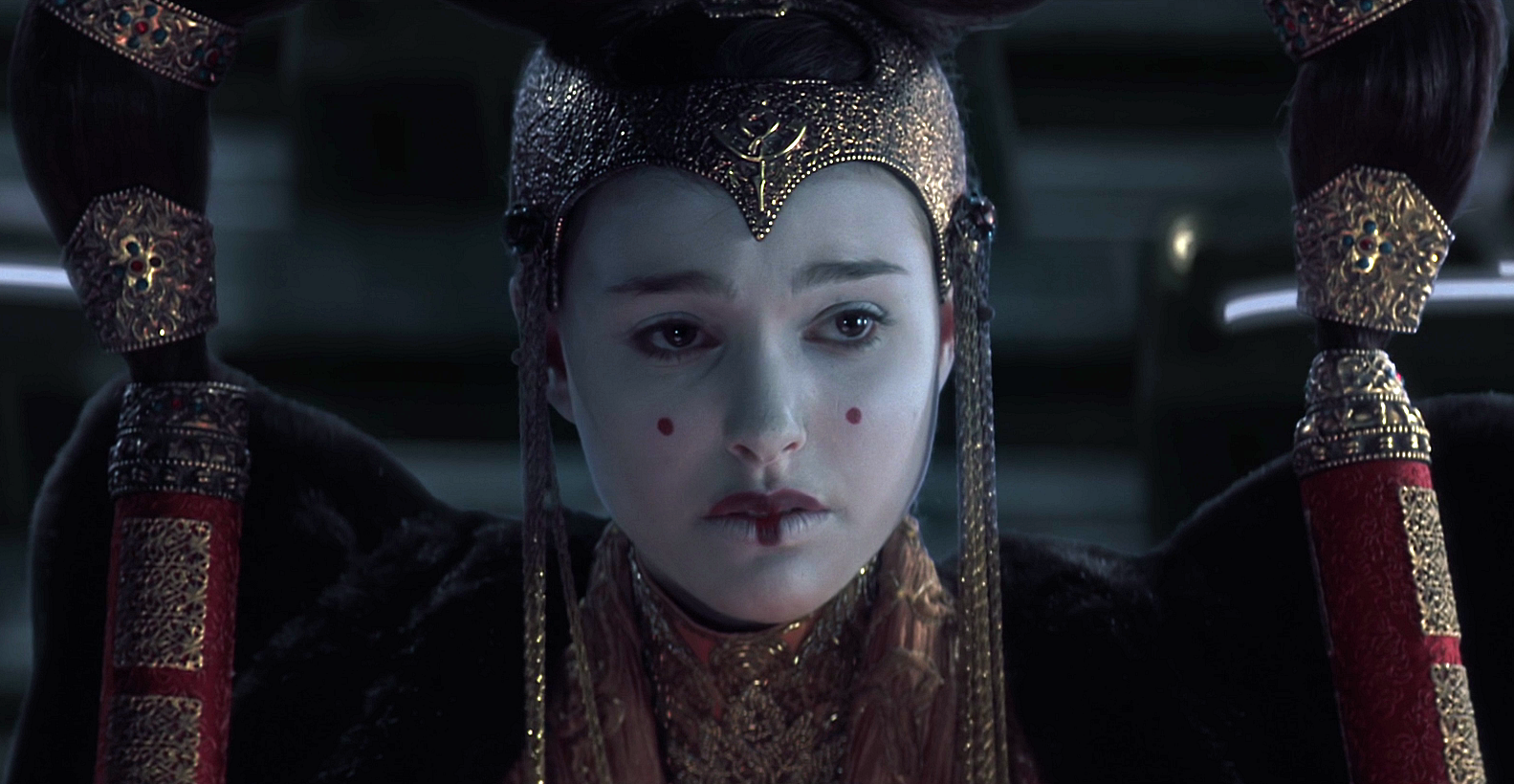
Queen Amidala was frustrated with the Senate's inefficient response to the invasion of her world.
In 32 BBY, Naboo was blockaded and invaded by the Trade Federation—Viceroy Gunray wanted to force the corporation's Senate dispute on trade route taxation to conclude in their favor. However, the sovereign Naboo people had democratically elected the fourteen-year-old Padmé Amidala as their queen—her youth reflected Naboo culture's emphasis on education and protecting their monarchical tradition against the impersonal and cynical aspects of modern politics—who refused to yield. The Chancellor had also sent Jedi ambassadors Qui-Gon Jinn and Obi-Wan Kenobi to Naboo, and they escorted Queen Amidala to the Senate on Coruscant. The Queen deemed the invasion illegal, and she was frustrated with the Senate's inaction and complacency, with Senator Aks Moe agreeing with the Federation's Senator Lott Dod to simply establish a commission to evaluate the events on Naboo.
Senator Palpatine then convinced Amidala that the Senate was suffering from the weak leadership of Chancellor Valorum and alleged that he was being unduly influenced by the Republic's bureaucrats, who were in turn on the payroll of the Trade Federation. Palpatine thus successfully suggested Amidala to move a Vote of No Confidence in Valorum. With Valorum defeated, Palpatine took advantage of other senators' sympathy for Naboo to win the following Chancellorship election, which was contested by Bail Antilles of Alderaan and Ainlee Teem of Malastare.

The humans and Gungans agreed to share their homeworld in peace after uniting to repel the Trade Federation invasion.
Although the human Naboo people had colonized Naboo centuries ago, driving the native Gungan people underwater after arriving on the planet as refugees fleeing the Grizmallti civil war in the Core Worlds, Queen Amidala humbly appealed to the Gungans for help. The two peoples embraced their symbiotic bond and defeated the Trade Federation on their homeworld, but Qui-Gon Jinn was slain by a Sith Lord—the likes of whom the Jedi Order had assumed to be extinct for a thousand years—who was then defeated by Obi-Wan Kenobi. The Gungan High Council subsequently contributed to the planet's democratic process alongside the humans, particularly for off-world relations.
Unbeknownst to them all, Palpatine was secretly the Sith Lord Darth Sidious—master of Qui-Gon Jinn's killer and mastermind of the Trade Federation invasion. As Supreme Chancellor, he retained Mas Amedda as the Republic's Vice Chancellor and the Senate's Vice Chair and Speaker, with the canny bureaucrat being one of the very few individuals who knew that Palpatine was a Sith Lord. Dooku had allied with Sidious, believing that the Jedi blindly served a corrupt Senate and regretful over the death of Jinn, his former Jedi apprentice. Sidious anointed Dooku as his new Sith apprentice under the name "Darth Tyranus." In 24 BBY, Dooku gave the landmark Raxus Address, in which he lambasted the Republic's ineffectual bureaucracy and corruption and inspired many worlds to leave the Republic. Dooku unsuccessfully attempted to recruit Tarkin as Eriadu's governor to the Separatist cause, proving Tarkin's loyalty to Palpatine and preventing the count from having a economic stranglehold over the Republic.
Chancellor Palpatine held on to power past the typical term limits due to the resulting Separatist Crisis, with evermore star systems discontent with the Republic's system of governance threatening to leave the union. Nute Gunray remained as viceroy of the Trade Federation despite undergoing four trials at the Republic's Supreme Court, and, with an eye on personal profit, he pledged military support for the rival state to which the secessionist movement flocked—Dooku's Confederacy of Independent Systems.
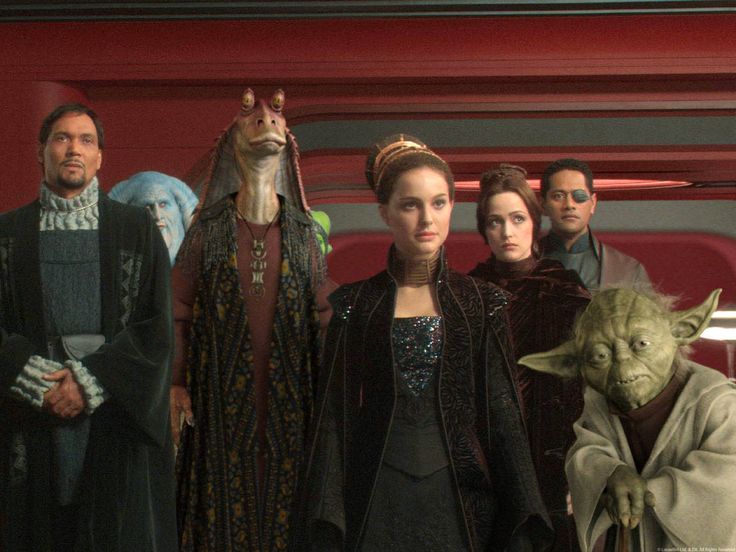
The targeting of Senator Amidala, a vocal advocate of the Republic's constitutional and peaceful democracy, prompted intervention of Jedi.
After refusing an offer to amend the Naboo constitution to stay as queen, Padmé Amidala tirelessly campaigned against the Republic's Military Creation Bill as Naboo's senator and joined Chancellor Palpatine's Loyalist Committee, wishing to defend the Republic and democracy against the Separatist threat. Dooku hired bounty hunters to assassinate Amidala in 22 BBY to no avail.
At a meeting between Palpatine's committee and members of the Jedi Order, the High Council admitted that it was unaware of the identity of the assassins' benefactor but vowed to investigate. Amidala placed her suspicions on Dooku and believed that he intended to destabilize the Republic, though the leading Jedi Council member Ki-Adi-Mundi dismissed Dooku as simply a "political idealist." Later in private, Jedi Master Obi-Wan Kenobi discussed his skepticism of all politicians with his Padawan Anakin Skywalker; though Skywalker felt Amidala and Chancellor Palpatine were different from most politicians, Kenobi spoke from his experience that senators forgone the "niceties of democracy" to appease those who would fund their political campaigns, and he also thought that Palpatine cleverly took advantage of senators' "passions and prejudices."

Democratic politics were discussed between Anakin Skywalker (left) and Padmé Amidala (right).
On the Jedi Council's suggestion and the Chancellor's order, Amidala briefly hid on Naboo with Padawan Skywalker to prevent further attempts on her life. The two debated the issue of democracy as they became secret lovers—as opposed to simply "popular rule," Amidala believed that constitutional laws such as term limits were integral to democracy so that politics gave people what they "needed" rather than simply what they "wanted," while Skywalker expressed his admiration for Palpatine as a strong leader. Meanwhile, Master Kenobi reported to Jedi Council leaders Yoda and Mace Windu of his discovery of a clone army. Kenobi was told that it had been ordered by the late Master Sifo-Dyas on Kamino—an extragalactic world outside the Republic governed by Prime Minister Lama Su and his Ruling Council—and the clones were based on the bounty hunter Jango Fett, who claimed to have been hired by a "Lord Tyranus."
The discovery of a Separatist Droid Army on Geonosis prompted Vice Chair Mas Amedda to persuade to Naboo's Gungan representative, Jar Jar Binks, to call on the Senate to grant the Chancellor unprecedented emergency powers to form a new Grand Army. Masters Yoda and Windu brought news of a clone army from Kamino to the Republic while Dooku's Separatists attempted to execute the Jedi on Geonosis, sparking the beginning of the Clone Wars. The Sith mastermind's public persona, Chancellor Palpatine, pledged his "love" for democracy and the Republic and promised to lay down his powers at the end of the conflict.
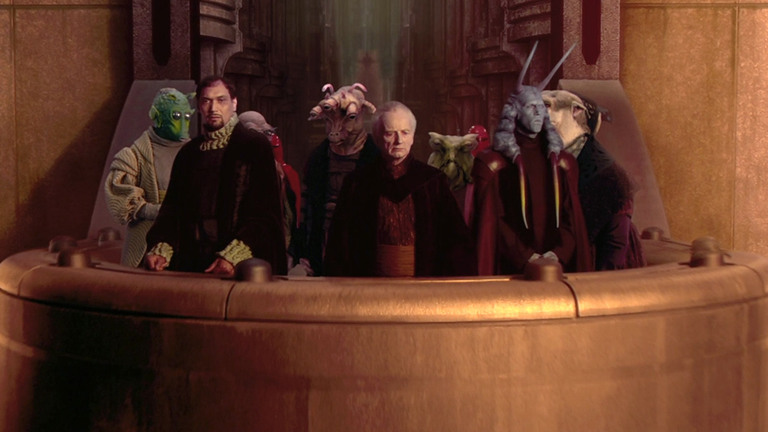
Padmé Amidala's opposition to militarization in the Senate was overruled by Palpatine's emergency powers and machinations.
The Reflex Amendment to the Republic constitution gave the Chancellor's office near-total power over military matters, making Palpatine the most powerful Chancellor since the Ruusan Reformations. He was also granted direct control of the HoloNet, which featured damning footage of Separatist rights violations that were timed to attempts for peace talks in the Senate, and his consolidation of power was supported by propaganda pieces produced by the Commission for the Protection of the Republic, which was associated with Admiral Wilhuff Tarkin of the Republic Navy. The Senate's Naval Subcommittee approved contracts with arms manufacturers such as Sienar Fleet Systems and Kuat Drive Yards to supply the fleets, with the Kuat subsidiary Rothana Heavy Engineering having supplied the Kaminoan government with the Acclamator-class cruisers that Yoda had led on Geonosis.
During the war, the Republic Security Council changed from a Senate committee that made recommendations to the legislature into an advisory council for the Supreme Chancellor on military matters. It oversaw decision-making on which worlds to defend or attack and, along with the Chancellor, could activate any of the 150 general orders subconsciously memorized by each clone in the Grand Army. While Republic civilians ran the Senate Bureau of Intelligence, it was separate from the Republic Intelligence service under the military. At some point during the war, Republic citizens staged a protest against militarization at the Carida Academy, and the father of future rebel Cassian Andor was killed at the demonstration.
In 21 BBY, while the Senate considered a financial reform bill to deregulate the InterGalactic Banking Clan to open more lines of credit to fund the Republic Military, the Loyalist Senators Padmé Amidala, Bail Organa of Alderaan, Onaconda Farr of Rodia, and Mon Mothma of Chandrila led the opposition. Meanwhile, Amidala broke a Republic law prohibiting diplomatic contact with the Separatists by contacting the Separatist pro-peace politician Mina Bonteri of Onderon, and they spearheaded the Confederate–Republic peace initiative. When Voe Atell declared that the Corporate Alliance would not allow the Confederacy to make a peace offering in the Separatist Parliament, Kerch Kushi countered that the Confederacy was a democracy and, "unlike the Republic," was not ruled by corporations.
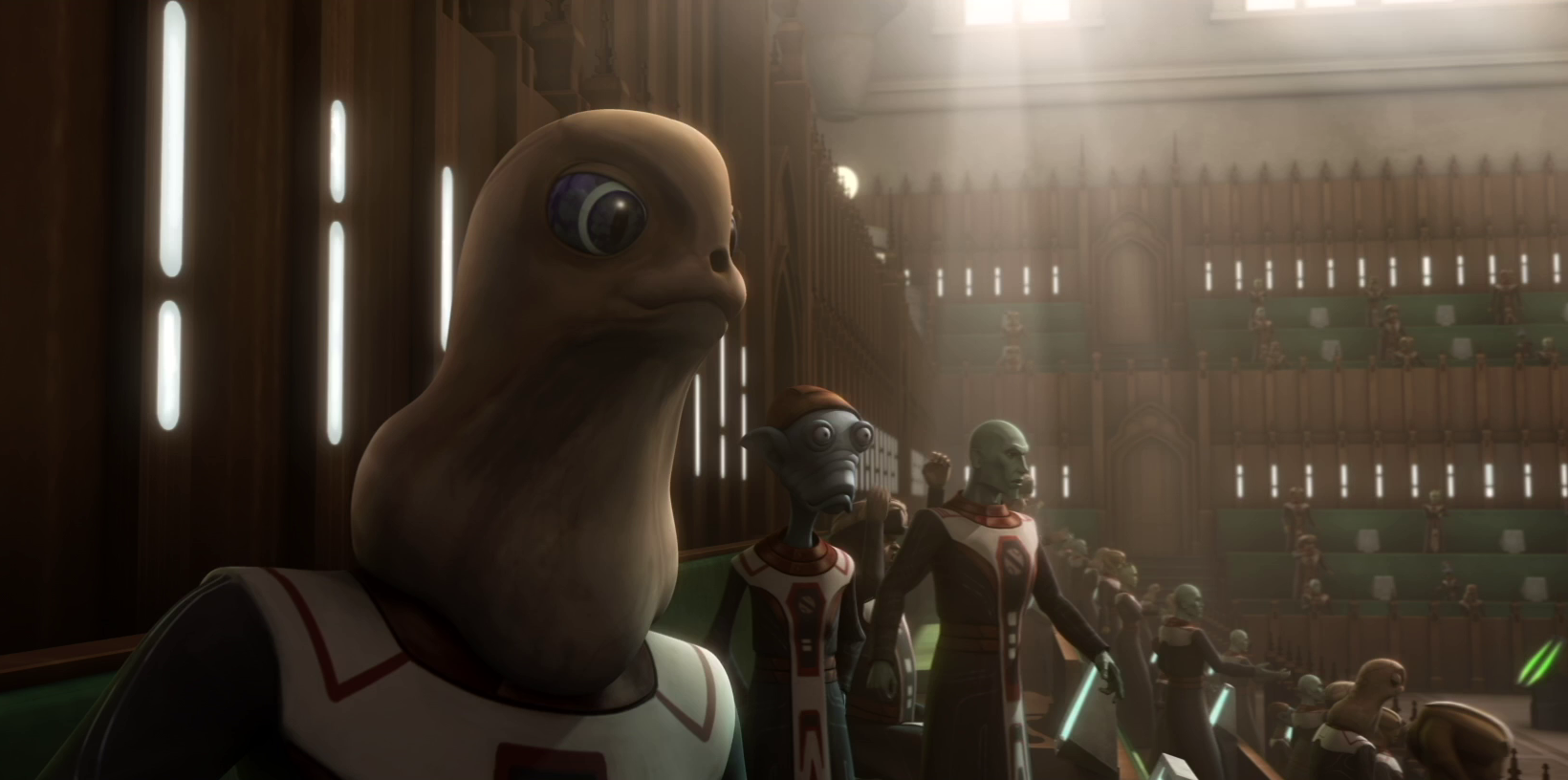
Arguments for and against peace with the Republic were hurled across the Separatist Parliament's benches.
However, Dooku secretly bypassed the Separatist legislature by assassinating Bonteri, blaming the tragedy on the Republic, and then bombing the Republic capital of Coruscant, which scuppered the peace process. While the Republic Senate approved the deregulation bill, debates on financial reform nevertheless continued with the Kaminoan Senator Halle Burtoni's proposal for the Republic to purchase five million more clone troopers. The Banking Clan, which had been charging the Republic 10% interest on its war loan, claimed that it lended money to the Separatists at an increased interest rate to fund three million new battle droids and increased its Republic interest rate to 25%.
Amidala believed that the Republic would be bankrupt if the Senate passed the bill, leading to public spending cuts to the maintenance of basic social services, education, healthcare, and infrastructure. However, senators who were not in support of the proposals were being intimidated and even severely assaulted by thugs hired by Dooku on Coruscant, which was already experiencing mandatory power blackouts and other harsh austerity measures of water and foodstuff under the Victory Rationing Program. Despite Senators Farr, Amidala, and Organa being attacked in succession in the streets of Coruscant, Amidala's aide Teckla Minnau encouraged the Naboo politician to address the Senate.
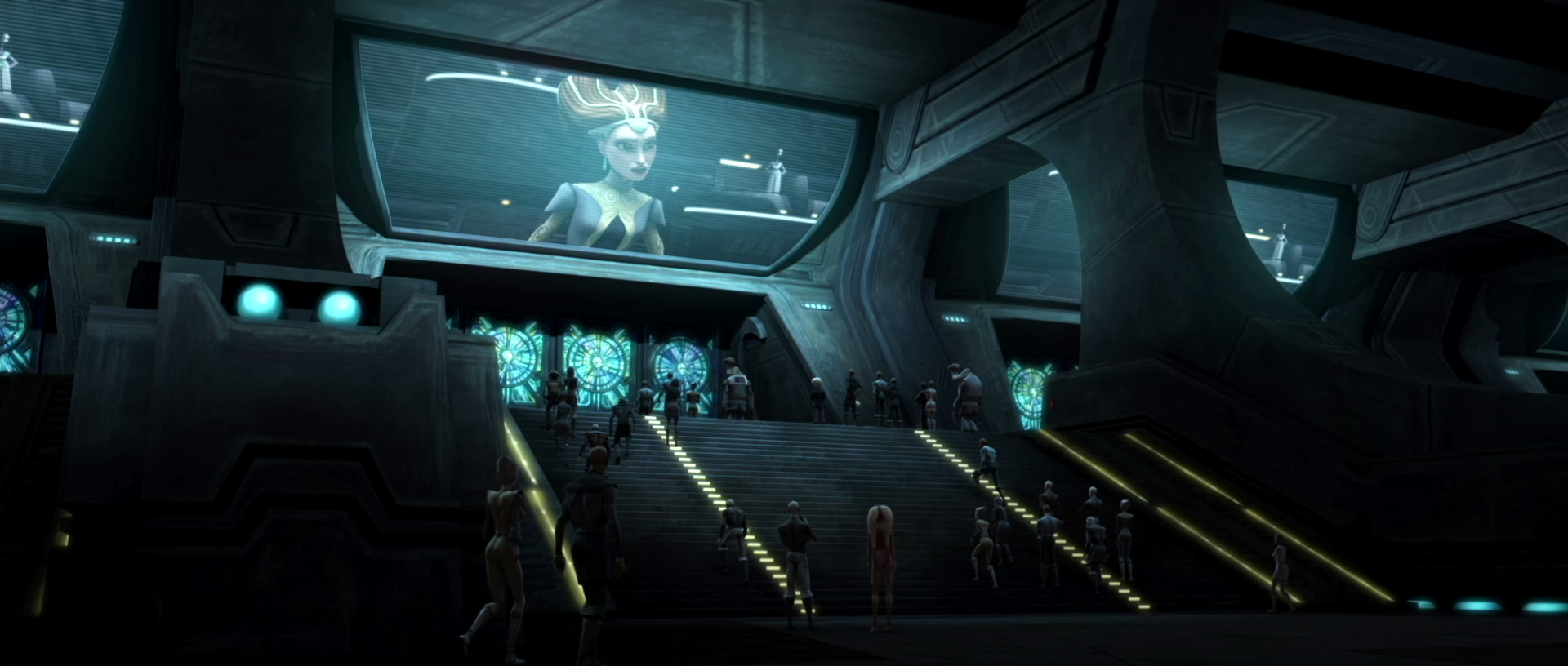
Senator Amidala was defiant in arguing against military spending increases at the expense of basic services to Republic citizens.
By citing Minnau as a Republic citizen whose livelihood depended on the basic services provided by the Republic, Amidala argued that the lives for which the Republic defended in the war would be upended if state funding was diverted to the military. Other senators were thus persuaded to defeat the bill, slowing the war to Palpatine's private annoyance. However, the Senate eventually passed the proposal to increase military spending and rejected Senators Amidala and Farr's motion to reduce it despite Amidala having succeeded in persuading the Roonan Senator Aang, who held the deciding vote on the issue on the Military Oversight Committee.
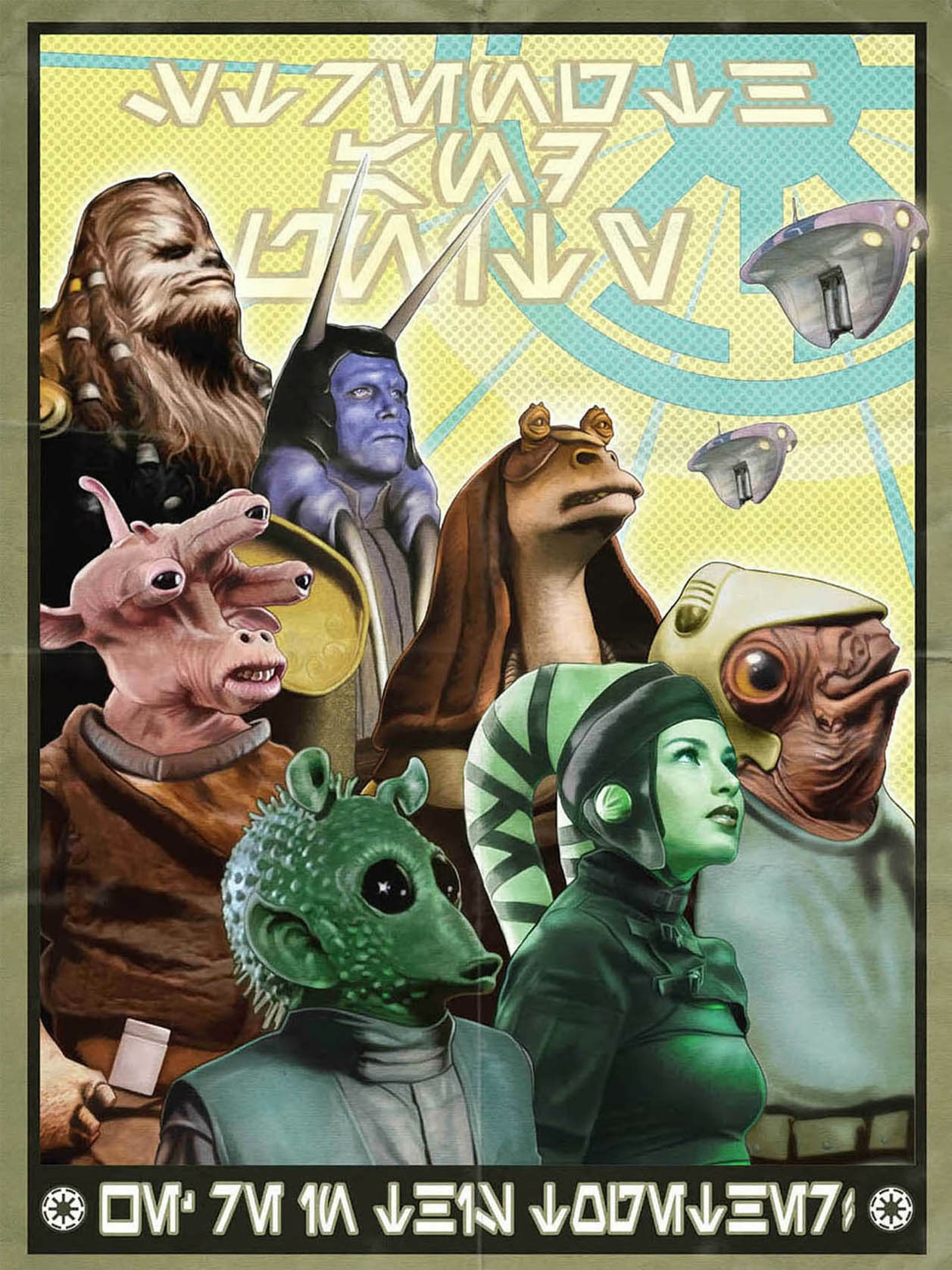
Strength and Unity poster showcasing peoples of diverse backgrounds uniting for the Republic
As a part of the Republic, the Pantoran people of the moon Pantora claimed Pantora's planet, named Orto Plutonia, as their protectorate territory as it was believed to be uninhabited. Despite discovering the presence of the native Talz people in 21 BBY, the Pantoran Supreme Chairman Chi Cho insisted on his people's sovereignty over the planet and declared war; the Jedi were not able to interefere in their capacity as the Republic Senate's peacekeepers as Chairman Cho declared that the Pantorans' dealings with the Talz were an internal affair.
Pantoran Senator Riyo Chuchi then spoke with the democratic Pantoran Assembly, which declared Cho's act of war as out of order and whose speaker authorized the senator to petition the Jedi Council to interefere. However, Chuchi was able to negotiate directly with the Talz Chieftain, Thi-Sen, ending the war with the Pantoran people recognizing the sovereignty of the Talz people.
Later in 21 BBY, Onaconda Farr and fellow senator, Kin Robb of Taris, joined the Council of Neutral Systems, a group of 1,500 star systems that wished to remain neutral in the Clone Wars and were represented in the Republic Senate. The Council was led by Duchess Satine Kryze of Mandalore, and many of its member systems' economies relied on trade with both Republic and Separatist systems. Decrying violence as extremism, the Duchess became occupied with the terrorist activities of Death Watch, a band of militant Mandalorians that was funded by Count Dooku and later appropriated by the renegade Sith Lord and crime lord Maul.
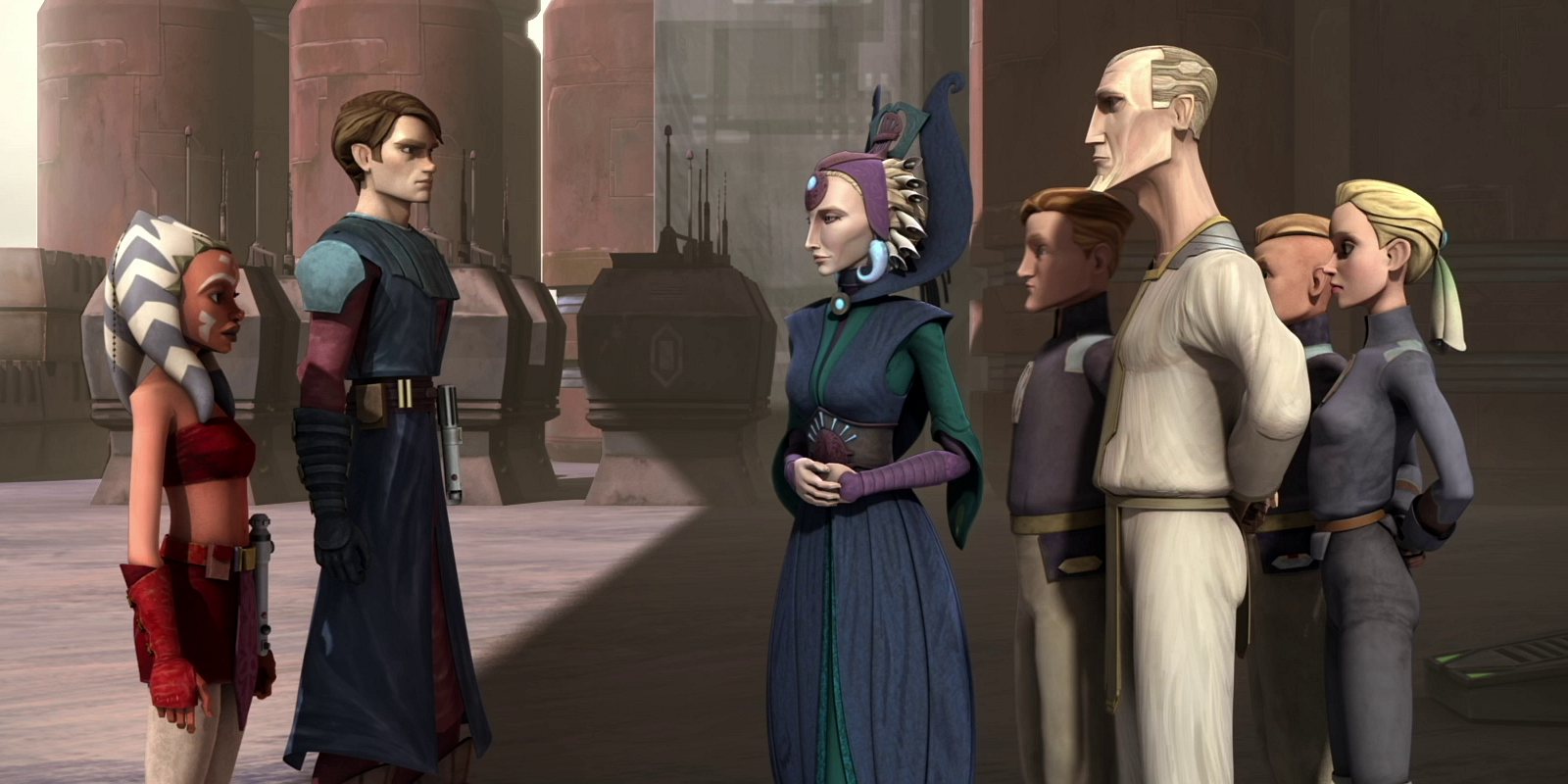
Away from the Republic's war, the Jedi Anakin Skywalker and Ahsoka Tano worked with the leaders and people of Mandalore.
The Duchess secured Mandalore's neutrality from the Clone Wars, but supply pressures encouraged corruption within the Mandalorian government and citizens turned to the black market, including for tea that had been improperly diluted and turned toxic. Prime Minister Almec's government council refused to seek Republic help as they believed the Republic was more corrupt, so the Duchess and Senator Amidala privately appealed to the Jedi for help. Anakin Skywalker's Padawan, Ahsoka Tano, was assigned to Mandalore to investigate corruption undercover, ostensibly to teach at the Royal Academy of Government. Tano spoke of citizens' "duty" to scrutinize their leaders to encourage honesty and maintain accountable governance, inspiring a group of cadets led by Korkie Kryze to secretly infiltrate a food supply warehouse. They uncovered the Prime Minister's involvement in the black market conspiracy, leading to his arrest.
Afterward, Senator Bail Organa hosted a conference on Alderaan on the swelling numbers of refugees due to displacement by warfare. Padmé Amidala argued that the Senate should enact legislation to protect refugee rights as well as ensure that clone soldiers would have a sense of their own futures beyond the war. Amidala also advocated for opening diplomatic avenues to discuss an end to the war, stating that some in the Confederacy likewise desired peace while agents of chaos were everywhere and declaring that she would be steadfast in defending truth and democracy. Although another assassination attempt was made on Amidala's life, she was saved by Ahsoka Tano.
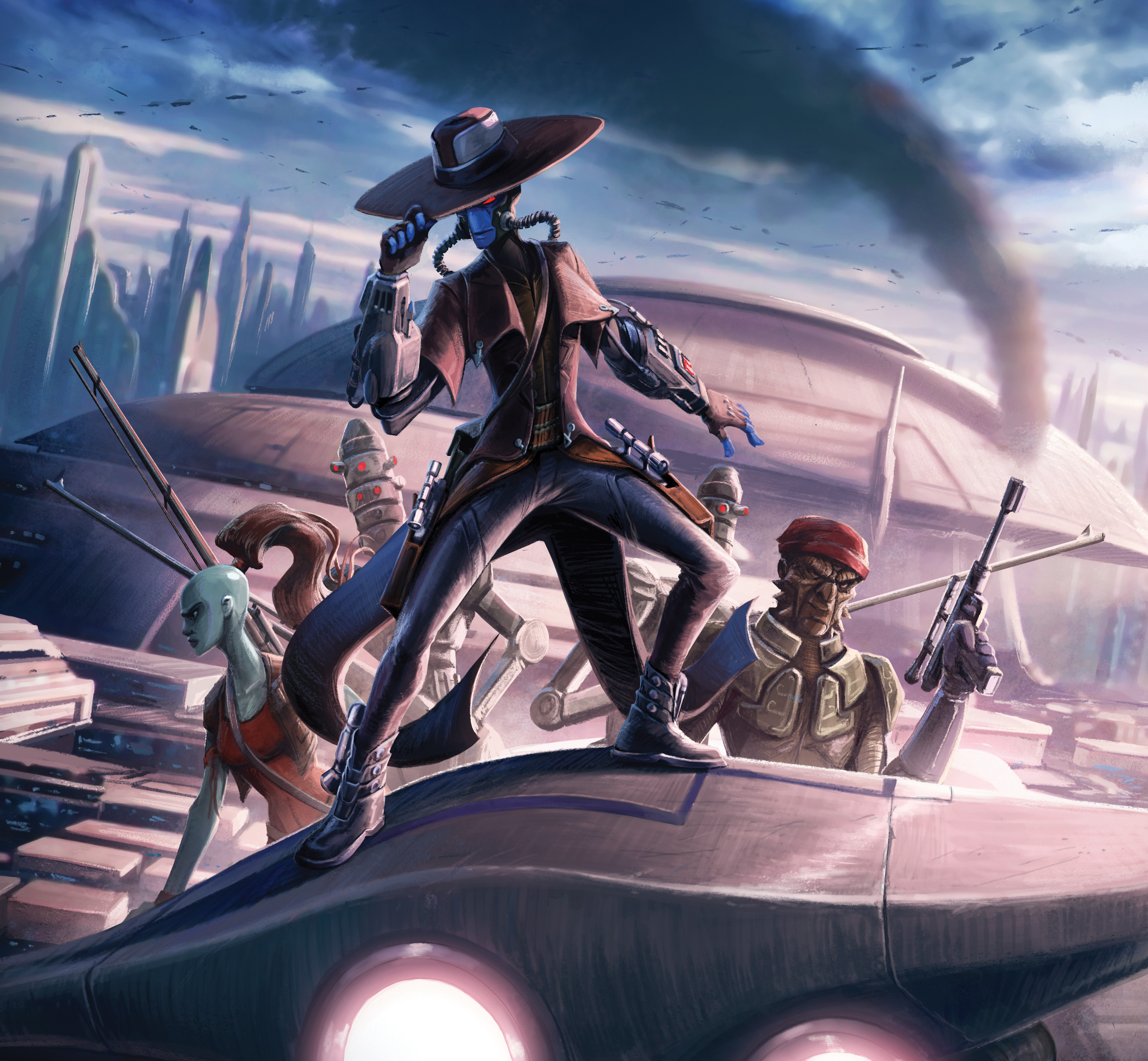
At the heart of the Republic, the Senate was sullied by a team of bounty hunters hired by the Hutt Clan.
Later in 21 BBY, the Senate was debating the Enhanced Privacy Invasion Bill, which proposed allowing the Chancellor to spy on Republic citizens suspected of being a Separatist, when a group of senators in opposition were taken hostage inside the Senate Office Building by Cad Bane. Leading other bounty hunters, Bane was hired by the Hutt Clan to demand the release of the crime lord Ziro the Hutt. While Ziro was set free and the Gran Senator Philo was killed, the other hostage senators survived, among them Padmé Amidala, Riyo Chuchi, Bail Organa, Onaconda Farr, and Kin Robb.
The Quarren Tikkes's election as Senator of Mon Cala was approved by the Mon Calamari government council, but he joined the Separatists and gained a seat on the Executive Separatist Council when the war began, representing the Free Dac Volunteers Engineering Corps and Pammant Docks, which produced Separatist capital ships. Other Separatist corporate leaders likewise supplied their starships and forces to the Confederacy military. Tikkes was replaced in the Republic Senate by the Quarren Tundra Dowmeia, who shared representation of Mon Cala with the Mon Calamari Senator Meena Tills.
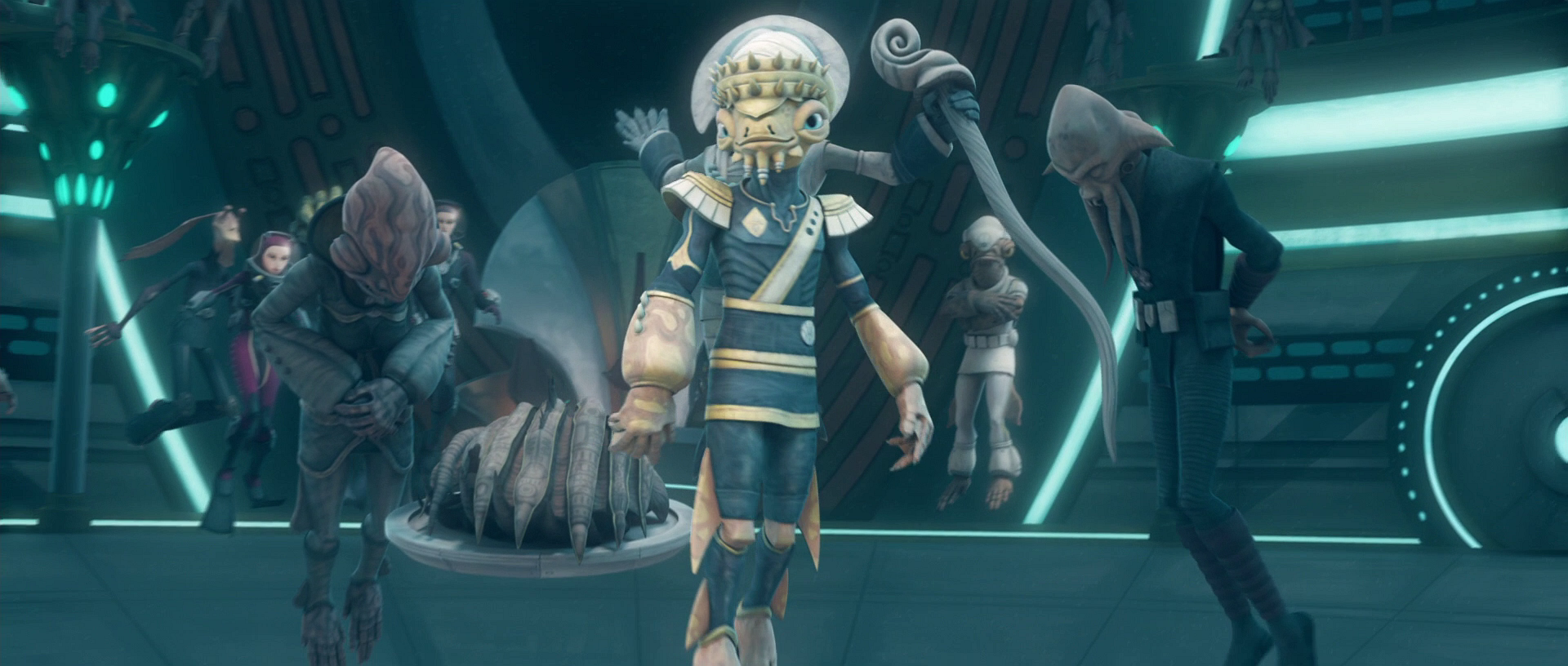
Both the Mon Calamari and Quarren peoples recognized Lee-Char as their king following a civil war stoked by the Separatists.
In 20 BBY, civil war erupted between the Quarren and Mon Calamari peoples on their shared homeworld after the Separatist-backed Quarren Isolation League of Chieftain Nossor Ri rebelled against the Mon Calamari monarchy, which had governed along with representatives of both species. The Mon Calamari Senator Meena Tills appointed Gial Ackbar the personal protector of Prince Lee-Char, heir to the throne, and appealed to the Jedi and the Republic for help, receiving additional Gungan reinforcements from Naboo. The Quarrens agreed to restore the monarchy under the Mon Calamari King Lee-Char after they discovered that Dooku had promised the Separatist ambassador, Riff Tamson, control of their world. All the same, Tikkes remained loyal to the Confederacy and maintained his seat on the Separatist Council.
The Aleena people on the planet Aleen maintained a pastoral way of life organized by faith and families, which formed tahiko kinship groups. Tahikos were represented by their eldest member in a planet-wide collective of advisors who elected the largely ceremonial King of Aleen, typically a priest. The Aleena had little contact with the wider galaxy to maintain peace with the Underworld, home to the Kindalo people, following a destructive and technologically advanced war between them millennia before the Clone Wars. The notional Kindalo government was a system of anarchical consensus, never taking action on a societal level unless every Kindalo agreed. The Kindalo therefore had only a handful of absolute laws, one of which was the compact that they shared with the Aleena: the separation of the two peoples, enforced by the Great Seal, which the Republic droids C-3PO and R2-D2 helped reseal when it was disturbed later in 20 BBY.
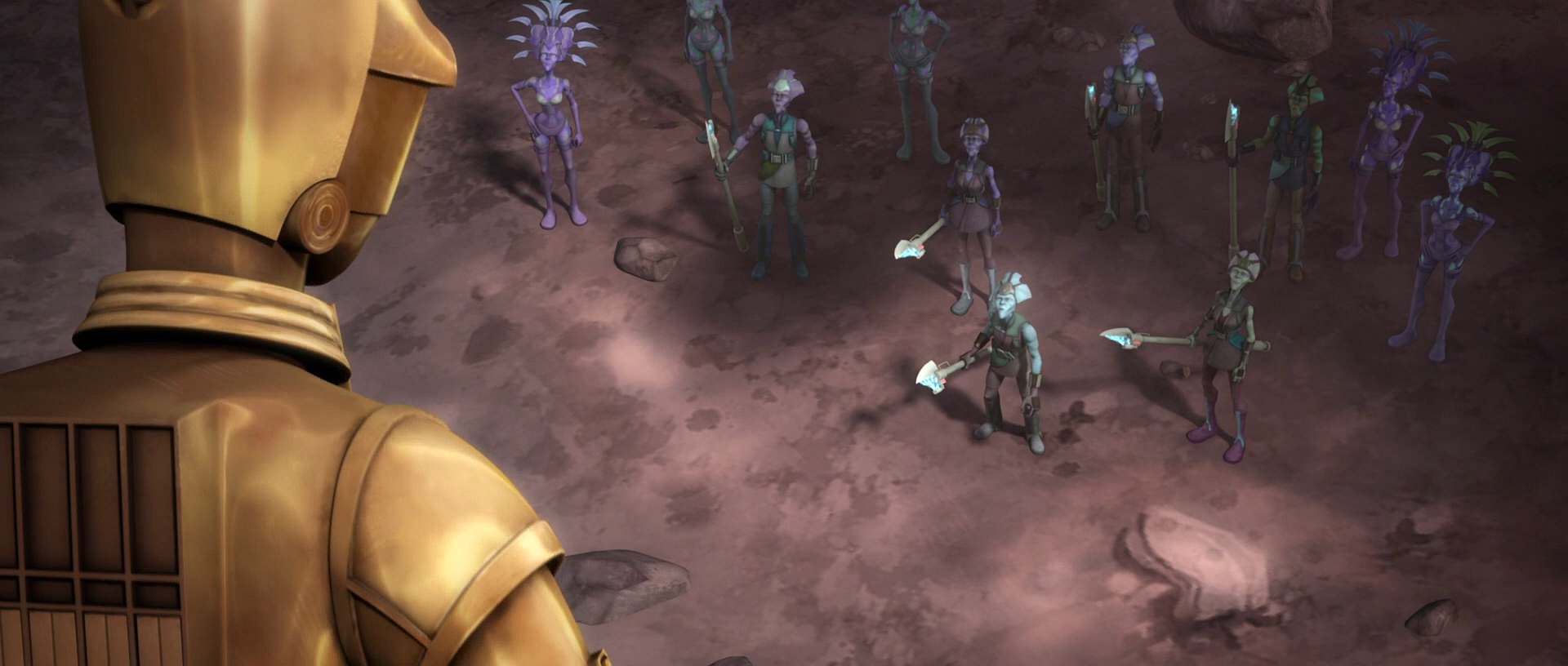
C-3PO introduced democracy to the Patitites after shoving R2-D2 onto their dictator.
C-3PO and R2-D2, who respectively assisted Senator Amidala and her Jedi husband, Anakin Skywalker, then stumbled upon the planet Patitite Pattuna, where they accidentally and literally stumbled upon the dictator "Big" Hay-Zu; the potentate of the petite Patitite people was killed when C-3PO knocked R2-D2 for making an uncivil remark and the falling R2-D2 crushed the "big" dictator. When the Patitites requested C-3PO to stay as their new leader, the droid instead suggested that they find someone among their own. C-3PO asked them to nominate three of the most intelligent, understanding, and compassionate individuals and then asked the remaining people to shout their support for the three nominees in turn. The crowd was unable to decide the winner and began scuffling, at which point C-3PO decided to leave them to build their "happy democracy" on their own.
A peace conference between Republic and Separatist politicians was chaired by Duchess Satine Kryze in 20 BBY. It was attended by Senators Amidala, Organa, and Mothma of the Republic and the Separatist Parliament's chair, Bec Lawise, and members Voe Atell and Amita Fonti—the latter two were corporate-allied politicians who had little interest in peace, and the talks indeed collapsed: the Separatists arrested Lux Bonteri, the son of the late Mina Bonteri, for accusing Dooku of assassinating his mother when barging into the meeting, and the Jedi Ahsoka Tano and R2-D2 battled the Separatist-allied Death Watch Mandalorians to rescue him.
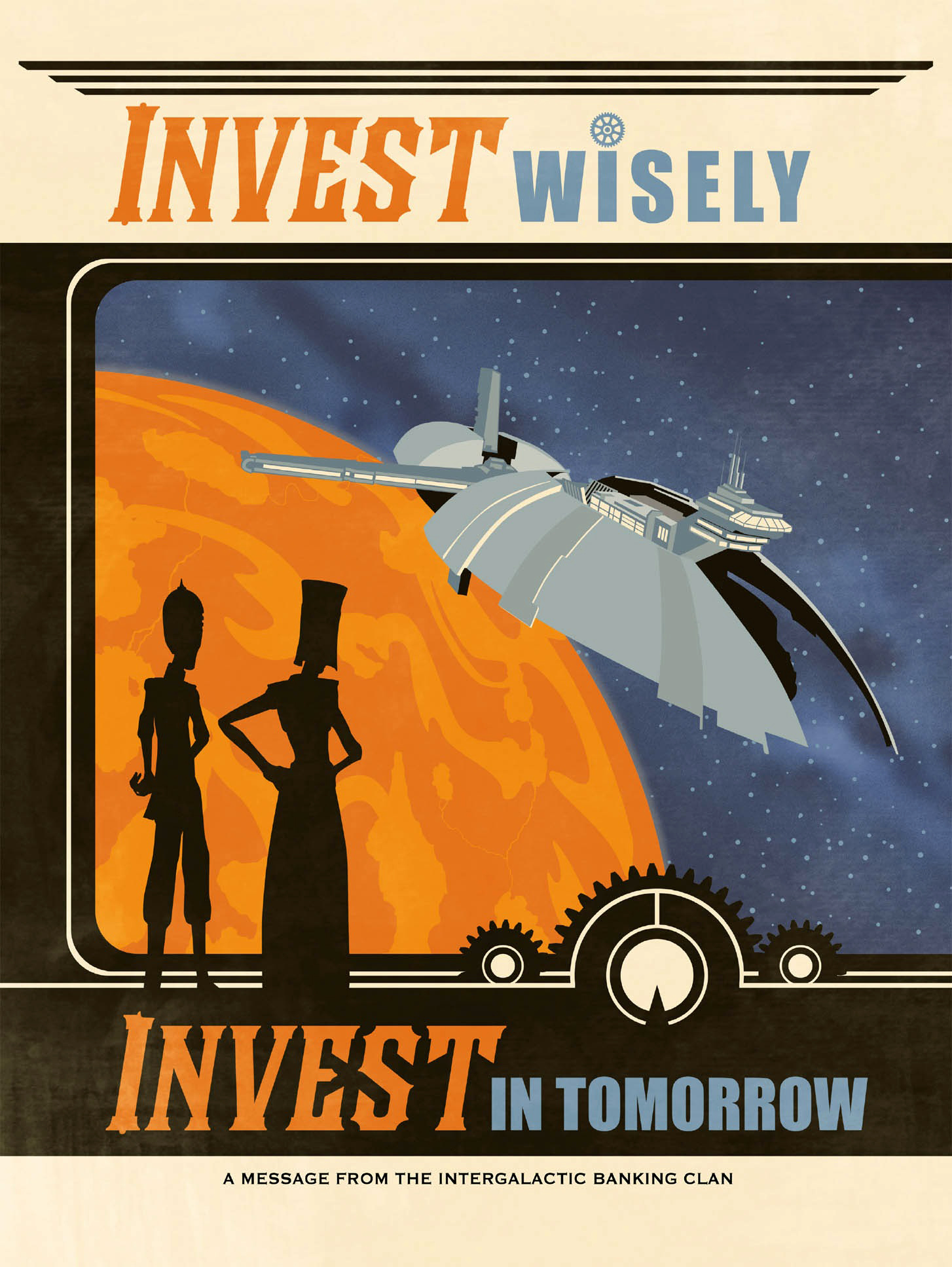
Invest Wisely poster, promoted by the InterGalactic Banking Clan to encourage more business with the corporation.
In 19 BBY, the Banking Clan continued funding both sides of the war, and its Core Five leaders were convincted of embezzlement by the Muun government, which appointed Rush Clovis at the agreement of both the Republic, whose delegation at the Banking Clan headquarters on Scipio was led by Senator Padmé Amidala, and the Separatists, whose delegation was represented by Bec Lawise. When Count Dooku secretly threatened Clovis that the Separatists would default on their Banking Clan loans, Clovis raised interest rates on the Republic. Senators Kin Robb, Meena Tills, and Mot-Not Rab expressed outrage at the bank that was amplified when Chancellor Palpatine confirmed that the Separatists did not experience a similar hike in rates.
The Republic delegation was then ambushed by Separatist forces, which arrested Senator Amidala upon Dooku's order. When Bec Lawise protested, claiming that the Separatist Parliament would never approve of the arrest, Dooku personally redirected Amidala's blaster to fire upon Lawise before abandoning Scipio. Given the support of senators alarmed by the news of the Separatist takeover of the banks, Chancellor Palpatine authorized a Republic invasion of Scipio, forcing the bank to cede its assets to the Office of the Chancellor.
In the same year, Queen Julia appealed to the Senate—specifically Jar Jar Binks—for help when members of her ruling Bahk-tov Council began to disappear. Although the council was led by the monarch whom it elected, policy decisions could only be made via an unanimous vote of the council, which included members of the pacifist Dagoyan Order. The Dagoyan Masters were abducted by the militant Frangawl Cult, but they were defeated by Jedi Master Mace Windu, who had been dispatched as Representative Binks' partner. Queen Julia thus proposed a new era of more friendly relations between the Dagoyan and Jedi Orders.

Already troubled by eroded public faith, the Jedi Order struggled to comprehend the Sith plot behind the clone army, protracted conflict, and centralization of the Republic.
During the war, the Republic also established a Population Observation program that surveyed public opinions on various aspects of the conflict, which revealed increasing anti-Jedi sentiment. While the Jedi Order had been thrusted into warfare, some Jedi insisted on remaining true to their traditions whereas others were willing to explore more extreme methods. After Dooku led the genocide on Mahranee in the third year of the war, in 19 BBY, the Jedi Council approved an assassination attempt on the ex-Jedi. After Master Quinlan Vos fell to the dark side and Dooku's ex-pupil Asajj Ventress risked her future to save Vos, the Jedi Council realized its mistake.
Some among the Jedi were critical of their Order's involvement in the war, such as Barriss Offee, who had killed fellow Jedi and also clone troopers and civilians to make her point and framed Ahsoka Tano for her terrorism. The Jedi Council expelled Tano from the Order and allowed her to be trialed by the Republic Military, with Chancellor Palpatine overseeing the proceedings and Admiral Tarkin pressing for Tano's prosecution while the jury was comprised of senators. Among them were Riyo Chuchi, Mon Mothma, Bail Organa, Mot-Not Rab, and Kin Robb, while Senator Padmé Amidala spoke in Tano's defense. The court case nearly came to a close in favor of Tano's prosecution when Anakin Skywalker presented Offee, who admitted the truth of her actions. Although the Jedi Council agreed to invite Tano back into the Order as a Jedi Knight, she decided to refuse and instead find her own path.
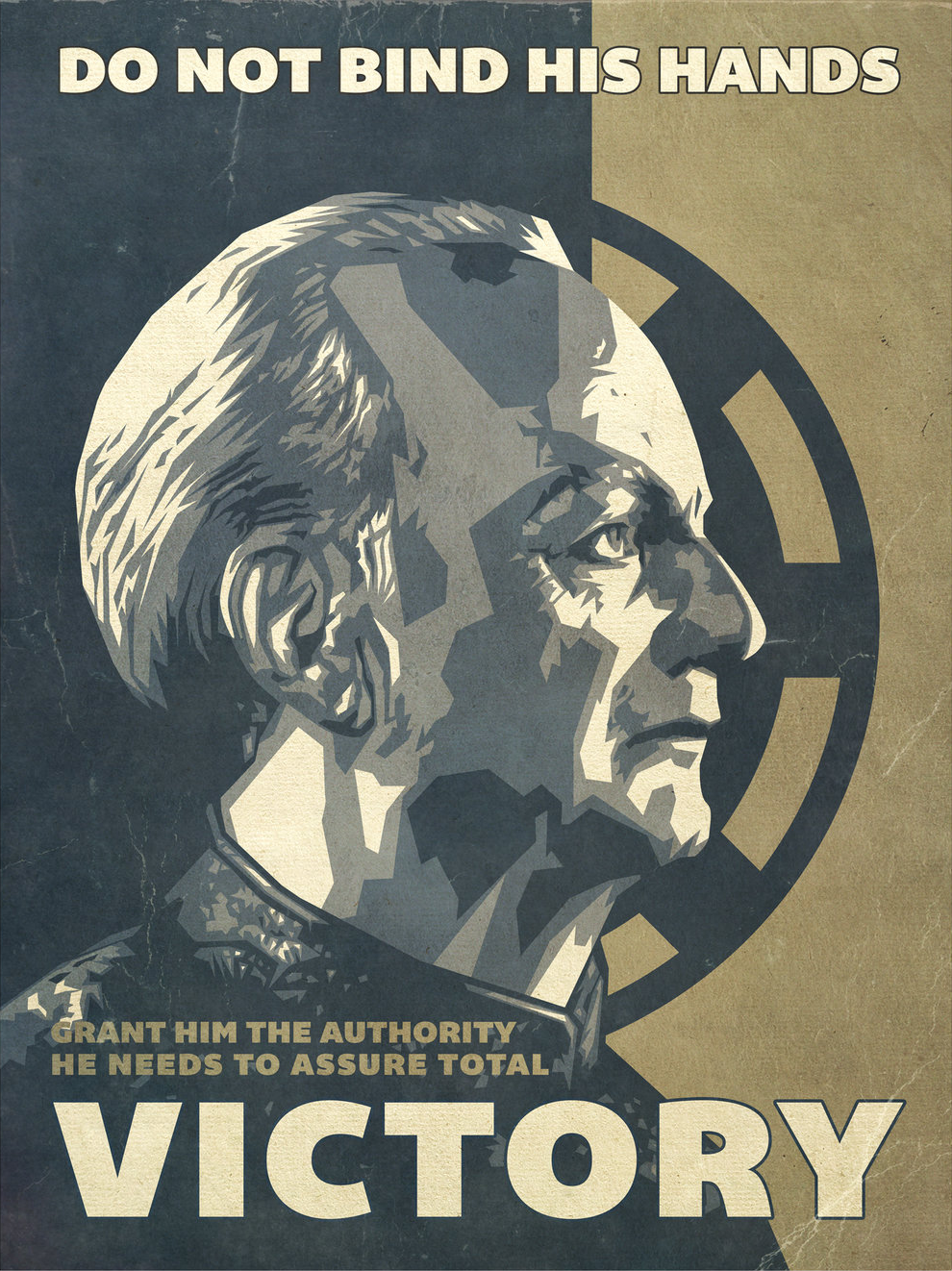
Do Not Bind His Hands poster praising Palpatine's procuring of power.
Late in the third year of the war, Obi-Wan Kenobi and Anakin Skywalker discovered that Count Dooku was the very same "Lord Tyranus" who had hired Jango Fett to be the clone troopers' template and worked with Master Sifo-Dyas, who had placed the order for a clone army on behalf of the Republic with the Kaminoans without the Senate's authorization. Combined with Dooku's claim that the Republic was controlled by a Dark Lord of the Sith and Quinlan Vos' discovery that Dooku himself was the Sith apprentice of Darth Sidious, Grand Master Yoda embarked on a spiritual quest where he nearly uncovered Sidious' identity. The Sith Lord therefore rushed to implement their Grand Plan against the Jedi by instigating the Battle of Coruscant.
Separatist forces kidnapped Supreme Chancellor Palpatine from Coruscant, prompting the Jedi Council to recall Kenobi and Skywalker from the Outer Rim Sieges. The act foiled an attempt by Sidious' ex-apprentice, Maul, to lure Skywalker to the war-torn world of Mandalore and caused Maul—who knew of the Grand Plan—to send his Shadow Collective criminal empire into hiding. Against Jedi ethics, Anakin Skywalker executed Dooku at Palpatine's command at the battle, furthering his fall to the dark side.
Although previous peace initiatives had failed, Padmé Amidala was a part of the Delegation of 2,000, Senatorial representatives including Meena Tills, Tundra Dowmeia, Mon Mothma, and Chi Eekway Papanoida in Riyo Chuchi's stead who met at Bail Organa's Cantham House office. The Sector Governance Decree—an amendment to the Galactic Constitution of sending governors to coordinate the Republic war effort by procuring any production facilities in their assigned sectors—was passed late into the third year of the conflict and served as the catalyst for the delegation, who planned to present their petition to Chancellor Palpatine to let go of his emergency powers once they had reached 2000 signatures. As the Outer Rim Sieges cornered the Separatists, the delegation wanted Palpatine to revoke his Sector Governance Decree and start ceasefire talks.
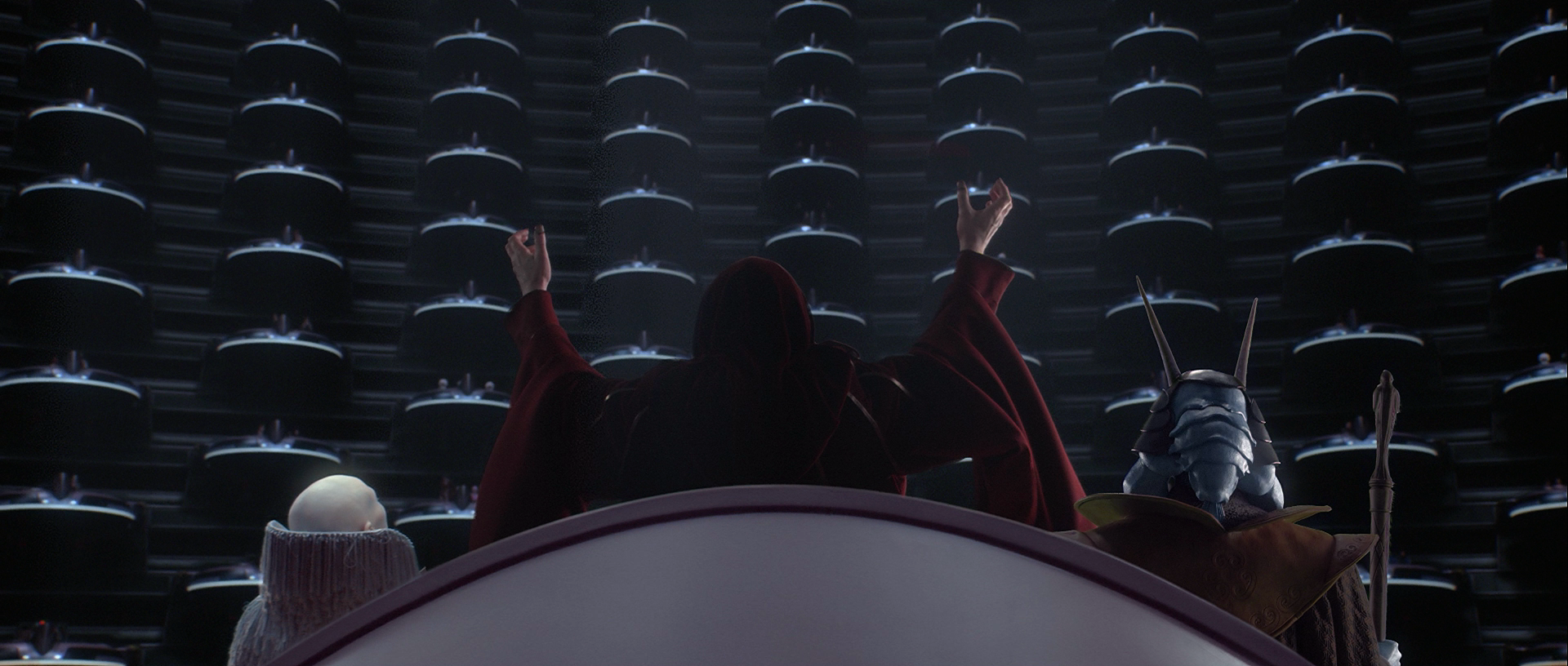
Palpatine declared himself Emperor, casting away the values of democracy and freedom and appealing to senators' desires for peace and security.
While Obi-Wan Kenobi pursued the remnants of the Separatist army in the Outer Rim, the Jedi Council demanded that the Chancellor relinquish his executive powers over the Senate given their belief that the war was at an end. However, Palpatine refused. Master Mace Windu initially told the Chancellor that the Senate would determine his fate, but after Palpatine confirmed that he indeed was the Sith Lord Darth Sidious who had orchestrated the Clone Wars, they battled until Windu deprived the Sith of his lightsaber. The Jedi Master was ready to kill his opponent, dismissing the Jedi Anakin Skywalker's demand that the Chancellor stand trial—Windu reasoned that the Sith Lord had control of the Senate and the courts. However, Skywalker helped Sidious kill Windu instead.
The Chancellor then declared all Jedi as traitors of the Republic and ordered the Republic army to destroy the Jedi Order. Skywalker had been seduced to the dark side due to his unwillingness to be rational and let go of his attachment and possessiveness of Padmé Amidala, as he had dreamt of his lover dying, and in his lust for the power to overcome death, he became the new Sith apprentice, named Darth Vader. Palpatine then proclaimed the reorganization of the Republic into the fascist Galactic Empire in the name of peace and security. With the peoples of the galaxy weary of war and many hoping for peace no matter the cost after untold billions had died, Palpatine's proclamation was gladly welcomed by many Senate representatives and the wider galaxy: as Amidala sadly noted, democracy died with a thunderous round of applause. Democratic principles were effectively rolled back on the galactic level with his personal dictatorship, and the corporate groups that backed the Separatist Alliance were absorbed by the regime.
Jedi Master Obi-Wan Kenobi survived the Jedi Purge and, on Mustafar where Vader executed the Separatist Council, declared his allegiance to the Republic and to democracy when confronting his former Jedi apprentice. Vader lost the duel but survived to become the Emperor's primary enforcer; Padmé Amidala died after confronting Vader about abetting the creation of the new Empire and lost the will to live. The self-anointed Emperor ushered in an era of rule by draconian laws, terror, and oppression, installing an authoritarian military state that was largely controlled by the Imperial Starfleet and armies. He appointed Governor-Generals and Moffs—sector governors who commanded planetary governors and were accountable only to the Imperial executive of high-ranking bureaucrats and the Emperor himself, rather than the war-weary citizens.
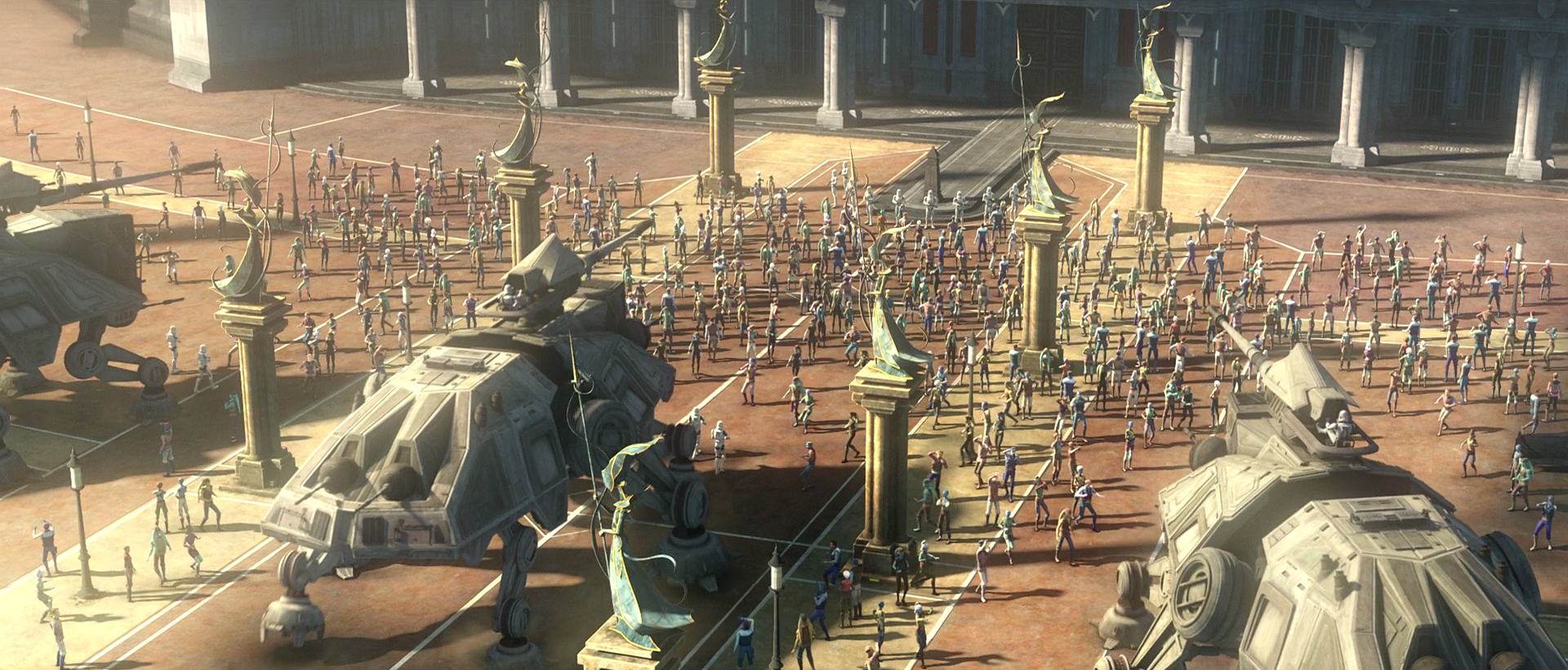
The Empire betrayed its promises and quelled opposition with brutal force, imposing a dictatorship over the ashes of democracy.
While the Emperor allowed the existence of an Imperial Senate, sixty-three senators who had been members of the Delegation of 2,000 were arrested and charged with treason on the day after the Empire's founding. Senators Mon Mothma and Bail Organa were released, but they found the new Senate disempowered. The Empire began occupying the former Separatist capital world, Raxus Secundus, early in its reign. Ex-Senator Avi Singh addressed a disgruntled crowd in Raxulon plaza square against the Imperial presence imposing itself without the people's consent, but Imperial tanks forcibly cleared the square.
Around the same time, upon Admiral Tarkin's instruction, Vice Admiral Edmon Rampart's Imperial forces destroyed the Kamino cloning facilities. When the Senate debated the Imperial Defense Recruitment Bill thereafter, Rampart explained that the bill would allow the Imperial Military to replace the aging clone trooper veterans inherited from the Republic with soldiers enlisted from Imperial populations. Speaking in opposition were Senators Riyo Chuchi, Bail Organa, and Tynnra Pamlo—the latter represented Taris and criticized the bill as a plan to unnecessarily build a new military, and they successfully forced the bill to be postponed for multiple debate sessions. The Kaminoan senator Halle Burtoni had been removed from office after learning that Rampart was embezzling funds on the Defense Finance Committee for his stormtrooper program, and she attempted to live a quiet life on Coruscant after criticizing Kaminoan Prime Minister Lama Su for arrogantly believing that the Empire needed their people's cloning services.
Senator Chuchi persuaded Burtoni to testify before the Senate about Rampart's misuse of government funding and—with the help of the Clone Underground movement and the "Bad Batch" squad, whose fellow clones were refused representation in the Senate and were fugitives from Imperial service themselves—publicly uncovered evidence of Rampart's fleet attacking Kamino. However, Emperor Palpatine, who had been absent from most Senate sessions and let Grand Vizier Mas Amedda preside alone, personally appeared in the Senate Chamber. He claimed that Rampart had acted without authorization and convinced the Imperial Senate to pass the bill into law, heralding the age of the Imperial stormtrooper.
Shortly afterward, Dr. Royce Hemlock, whose invasive procedures had violated the democratic ideals of the Republic, headed the Imperial Advanced Science Division and worked on unwilling clone subjects for the Emperor's secret biological experiments as part of Project Necromancer. After the Bad Batch scuppered Hemlock's facility, Grand Moff Wilhuff Tarkin redirected the relevant funds to Project Stardust.
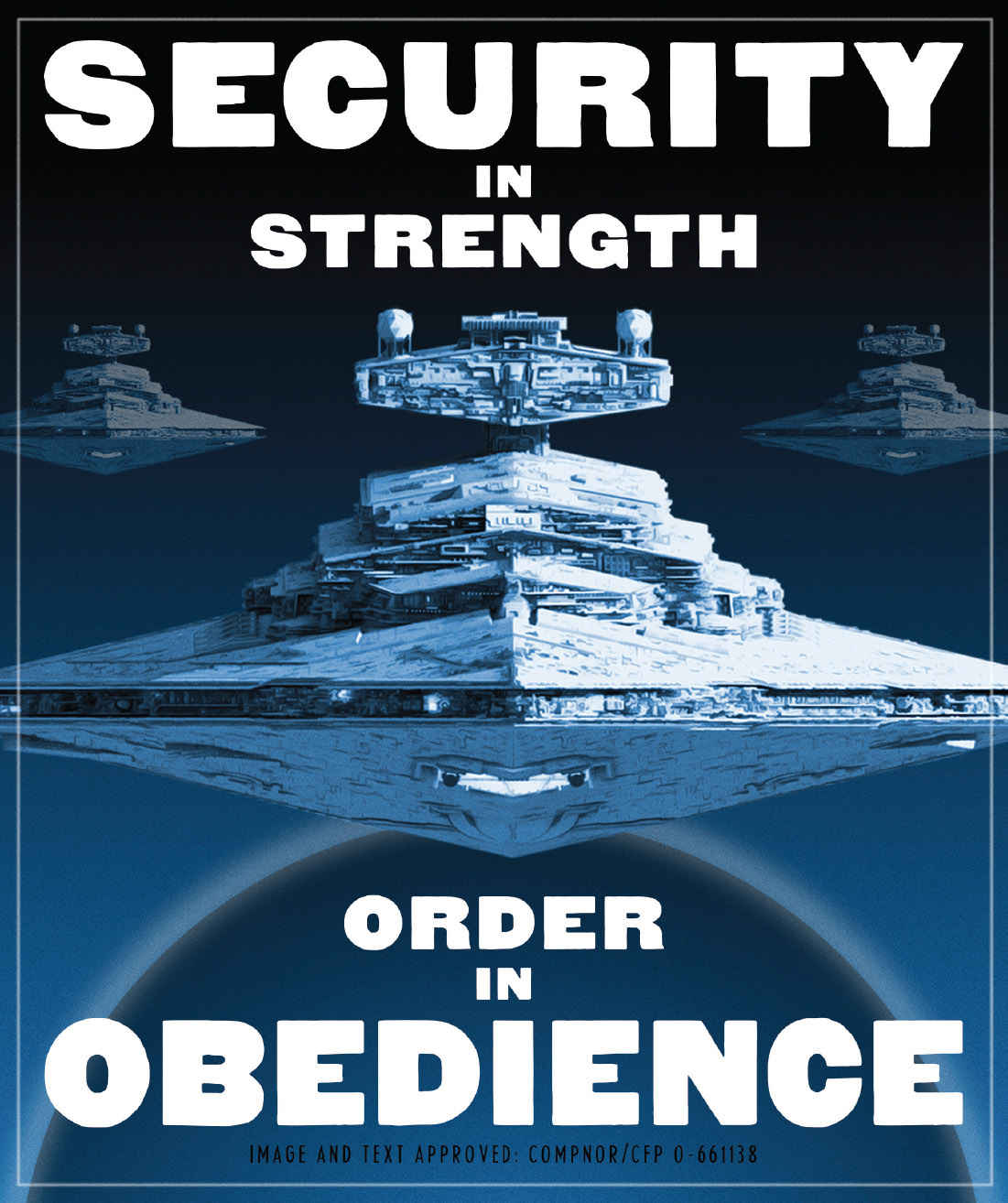
Strength & Obedience poster glorifying the Empire's military prowess.
The new regime also took advantage of the Outer Rim hyperlanes that the Republic had secured with the Hutt Cartel during the war, expanding without due regard to the sovereignty of neutral and independent star systems. The heavily industrialized former Separatist worlds were a boon to the Empire, which nationalized the means of production as part of Imperialization and brought substansive weapons equipment into the fold of the Imperial Military. A Senate bill intended to create more jobs on the Core World Corellia was amended by Imperial enforcers to the effect of turning the civilian Corellian shipyards into an offshoot of Kuat Drive Yards that made Star Destroyers. Consequently, the planet's upper atmosphere was heavily polluted, with the White Worms criminal gang roaming the streets between factories co-owned by Sienar Fleet Systems and the Santhe Corporation.
Wullf Yularen, who heroically served Anakin Skywalker during the Clone Wars, became a leading member of the Imperial Security Bureau, which took on law enforcement powers from local agencies such as Tanivos Divo's Coruscant Security Force; Divo retired during the Imperial Era, and his daughter, Andressa Divo, became a Security Bureau agent who supported the new government's increasingly extreme law enforcement tactics. Imperial High Command requested the Senate to revoke the Unknown Alien protocols, which required all contact with undiscovered sentient species to be investigated on behalf of the legislative body, and rumors that the Emperor was working to revoke the protocols circulated within the military.
The Empire attempted to retell history to justify Palpatine's usurpation of the "Old Republic" and totalitarian rule, suppressing alternative Republic and Separatist views of the Clone Wars and censoring relevant records, including references to the Jedi who served the democratic state. Post-Imperial historians criticized the twilight years of the Republic for being an era of distractions, with citizens embracing template escapist tales of heroes versus villains when attention should have been focused on corruption in governing institutions such as the Senate.
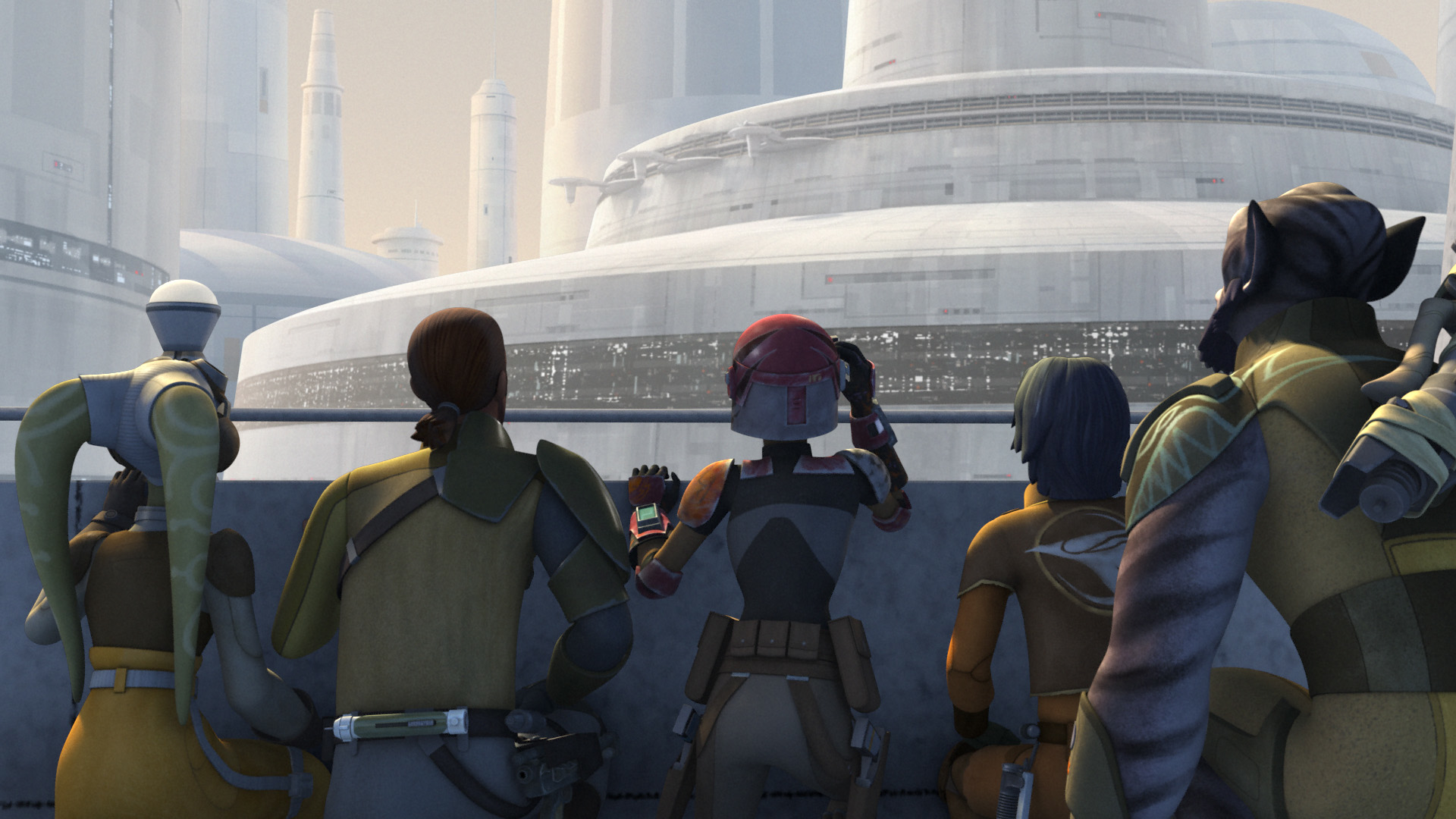
The Spectres (foreground) opposed the Imperial takeover of Lothal, which shuttered the world's Old Republic Senate (background).
The Empire struggled with acts of resistance due to its increasingly oppressive methods. In 18 BBY, the uprising on Raada was a spontaneous movement partly organized by former Jedi Ahsoka Tano and Bail Organa's secret resistance movement. The InterGalactic Banking Clan feigned loyalty to the Empire, which blockaded their headquarters of Scipio; the corporation secretly funded armed resistance against Imperial rule and was embroiled in violent trade wars against the Hutt Clan for access to smuggling routes.
The Outer Rim agriworld Lothal was governed from the Senate Building of the planet's capital until the Imperial occupation, funneling Lothal's resources for a new military-industrial complex that was overseen by the Imperial Complex. The Lothal Senate was supplanted by a growing government bureaucracy under Governor Arihnda Pryce, and, following insurgent activity by the Spectres family of rebels, a military lockdown of Lothal was later enforced by Grand Admiral Mitth'raw'nuruodo. Better known as Thrawn, the admiral hailed from the Unknown Regions' Chiss Ascendancy and maintained his people's isolation from the wider galaxy as he believed that democracy in the Republic was inefficient.
The planet Devaron in the Colonies region continued as a representative democracy, with the sparsely populated world's economy supported by remittances from off-world Devaronians—mostly men. Women dominated the Devaronian government and other leadership roles, including in businesses and the Senate, though the rule of law continued to enshrine gender equality. The people of Devaron were unhappy with the appointment of a human Imperial governor and tacitly approved a significant number of Devaronians to join the Rebellion, prompting the Empire to interfere in Devaronian remittances. Tholoth was also a democratic planet in the Colonies, being led by a head executive chair and a legislative senate in a governmental structure similar to that of the Republic's, but it was methodically Imperialized and its cosmopolitan culture of many species, architecture, and languages was stripped of elements that the Empire deemed foreign to the Tholothian species, becoming a mere resort for Imperial officers.
The Expansion Region planet Iktotch was also a representative democracy. Instead of installing an Imperial governor, the Empire simply imposed a blockade as the Iktotchi people were largely isolationist, informed by their cautious foresight of Imperial tyranny. Elsewhere in the region, the Empire sought to recruit warriors from Thisspias, where Imperial propaganda insisted on the Republic's decadence. The Thisspiasians resisted the Empire, whose governor deposed the Blood Monarch only to provoke more insurrection, with royalists and monarchical abolitionists working together against the Imperial occupation.
The semi-nomadic Vurk people of Sembla in the Outer Rim had a complex system of personal governance and political participation that was often dismissed and underestimated as primitive. Vurks addressed interpersonal disagreements by trying potential compromises to solve the issue, escalating to the community level and becoming casual rules of behavior. Vurks who disagreed migrated to other Vurk communities and were judged by their reputations, which in turn prompted new discussions on mores and consent, always questioning ethical and moral issues to better understand them. Imperials exploited the Vurks as a cheap labor force, and Vurks on other parts of Sembla were sometimes slow to unite against the Empire due to their culture of witnessing and discussing issues on a case-by-case basis.
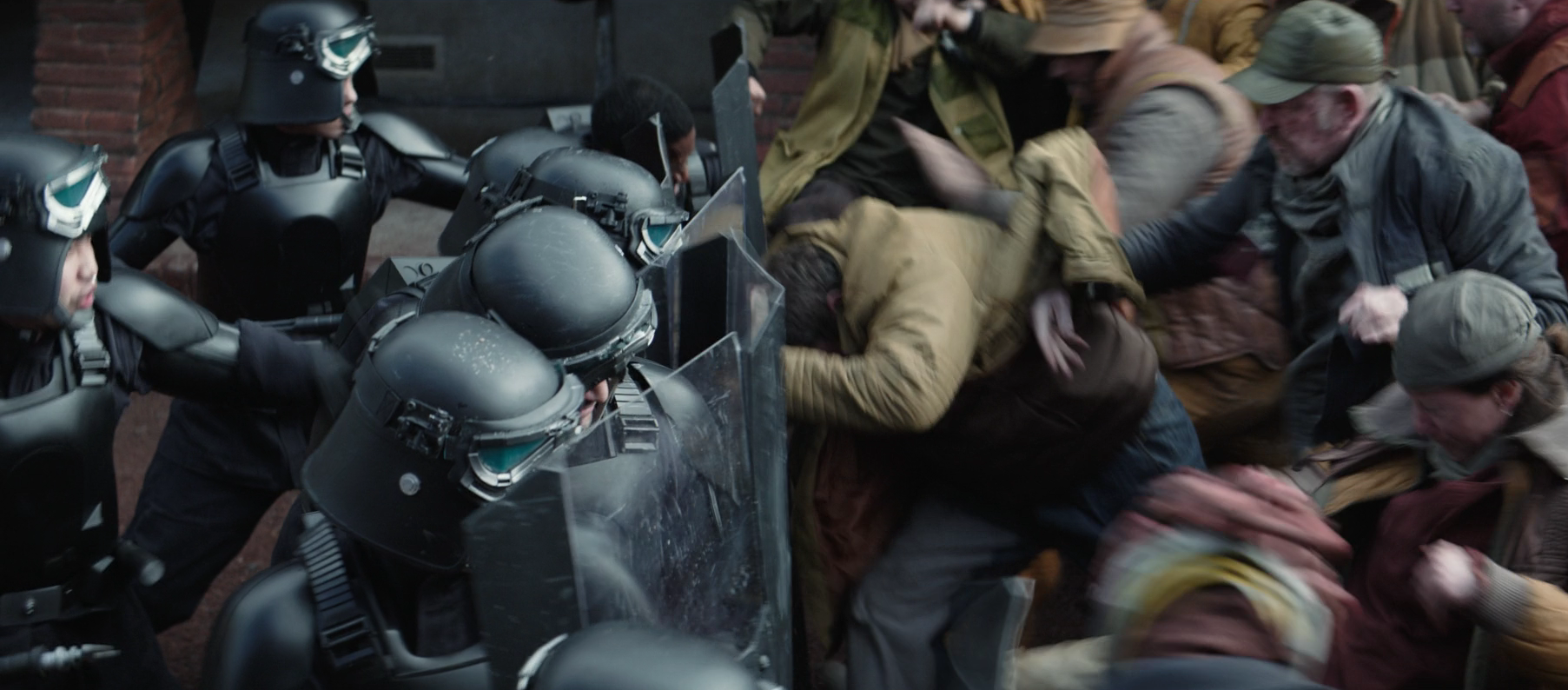
Citizens (right) fight for freedom against Imperial oppression.
In 5 BBY, Luthen Rael's Axis network organized a massive heist on Aldhani, but the Empire retaliated with the Imperial Emergency Act and the Public Order Resentencing Directive, which boosted Imperial Security Bureau powers to facilitate harsh crackdowns on any act deemed criminal. Senator Mon Mothma decried the directive as a "march towards complete unchallenged authority," which the Senate debated before passing the legislation. While preparing for the heist, Karis Nemik wrote a manifesto that advocated freedom as a "pure" idea that emerged spontaneously against the Empire's fragile tyranny, denouncing it as "the mask of fear."
Nemik bequeathed his text to Cassian Andor, whose mother, Maarva Carassi Andor, inspired an uprising on Ferrix soon afterward that eroded Imperial authority in the Morlani system, which had recently replaced Preox-Morlana's corporate control. In a recording broadcast at her funeral, Maarva encouraged the people of Ferrix to fight the "disease" perpetuated by the Imperial "bastards." Luthen Rael's efforts to stoke violent action against Imperial misrule made an impact on Mon Mothma, who had been more pacifist.
Senator Organa had adopted a daughter, Princess Leia Organa, following the death of her birth-mother, Padmé Amidala, and Leia helped the democracy movement after joining the Apprentice Legislature in 3 BBY. By that time, only forty worlds bothered sending junior representatives to the program given the declining influence of the Senate, but Organa found allies such as Harp Allor of Chandrila and Amilyn Holdo of Gatalenta. Mon Mothma resigned from the Senate to formally establish the Alliance to Restore the Republic following the Emperor's involvement in the massacre of peaceful protestors on Ghorman in 2 BBY.
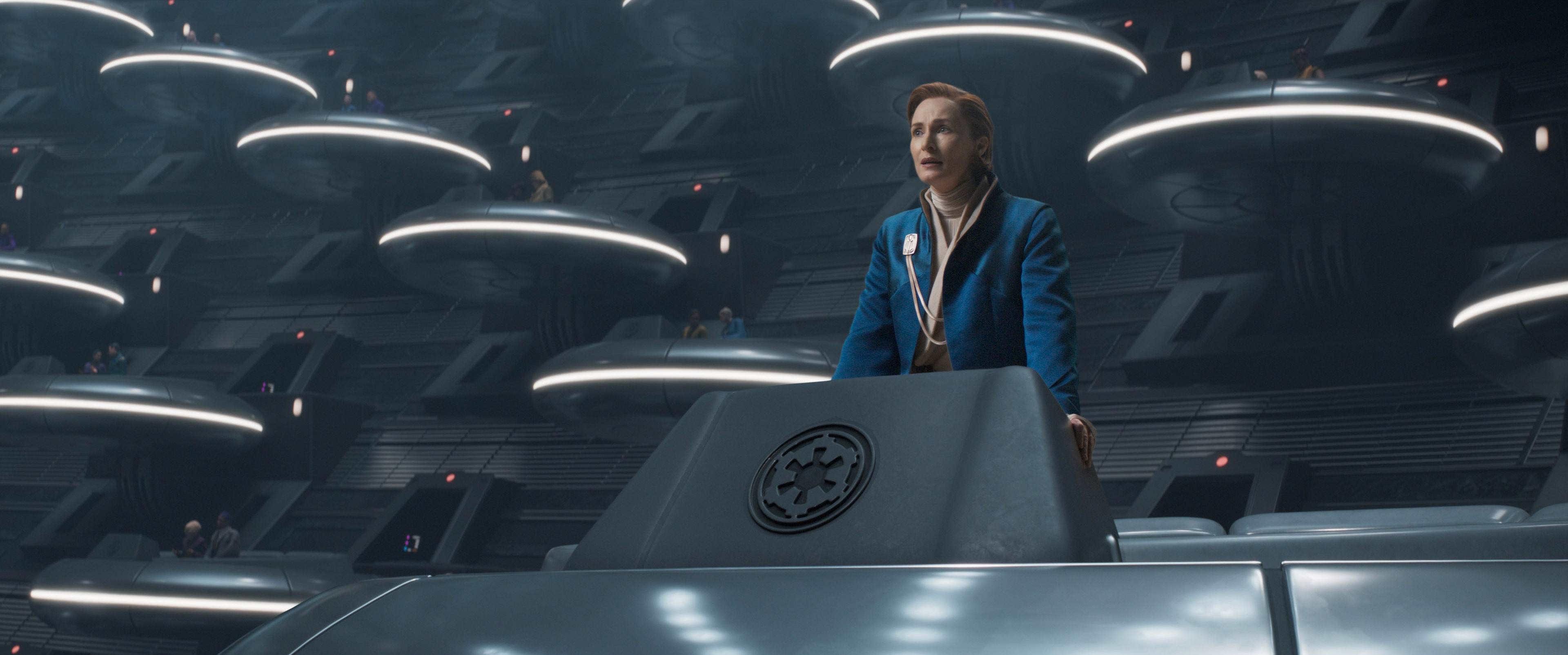
Democracy was not merely a memory but a hope for Mon Mothma, who continued speaking out for democratic principles in the Imperial Senate before leading the Rebellion.
A rebellious movement that aimed to restore galactic democracy, the Rebellion waged the Galactic Civil War against Imperial forces, though it also severed ties with Saw Gerrera and his Partisans for their brutal tactics and targeting of civilians, which Mothma deemed to violate the principles of the Ruusan Armistice and were unjustified even under a state of war. Mothma encouraged debate and disagreement in the cabinet of the Alliance Civil Government, which partook in Alliance High Command meetings alongside military leaders in a hidden fortress on the Outer Rim moon Yavin 4.
Nineteen years after the Empire's founding, the regime completed Project Stardust: the construction of the planet-destroying Death Star superweapon, which was tested on the Holy City of the Mid Rim moon Jedha. The Senate was told that the city was destroyed in a mining accident to prevent defections to the Rebellion, but the Alliance had confirmation of the Empire's "ultimate weapon." The rebels thus wanted to capture the project's scientific lead, Galen Erso, for a Senate hearing to expose the Empire's secret but killed him instead.
Alliance High Command disagreed on whether to invade the Imperial research installation on Scarif to secure the Death Star plans, with senators such as Tynnra Pamlo of Taris refusing to let the rebels escalate the war against the Empire out of fear for their people. After a lengthy argument with Mon Mothma, Senator Pamlo traveled to Coruscant to publicly decry the Death Star, resign her office, and urge the Rebellion to disband. A group of volunteer rebels led by Cassian Andor and Galen's daughter, Jyn Erso, also left Yavin 4. Under the code name Rogue One, they defied Alliance High Command by infiltrating Scarif themselves and were later supported by Admiral Raddus' Alliance Fleet. Through their sacrifice, Senator Leia Organa escaped the battle with the plans.
Palpatine formally dissolved the Senate following the completion of Death Star, and he transferred direct control of the Empire's territories to the regional governors. Grand Moff Tarkin declared the act as the removal of the last remnant of the Republic at a meeting of the Joint Chiefs of the Imperial Military, which included leaders such as Chief Cassio Tagge of the Imperial Army, Yularen of the Security Bureau, and Darth Vader, who had captured Leia Organa despite her legal protection as a diplomat. Tagge was shocked by the news of the Senate's dissolution, believing that the legislature, though troublesome, involved bureaucratic hurdles that were necessary to deter dissent.
Bail and Leia Organa had been monitored by Andressa Divo and the Imperial Security Bureau, which found evidence of the Alderaanians' links to the Rebellion. With Princess Organa detained aboard the new battle station as a rebel, Tarkin demonstrated its unparalleled firepower on Alderaan, where billions of beings, including Bail Organa and Tanivos Divo were present, obliterating the world. Tarkin believed that a galaxy-wide fear of the Death Star would silence any dissent.
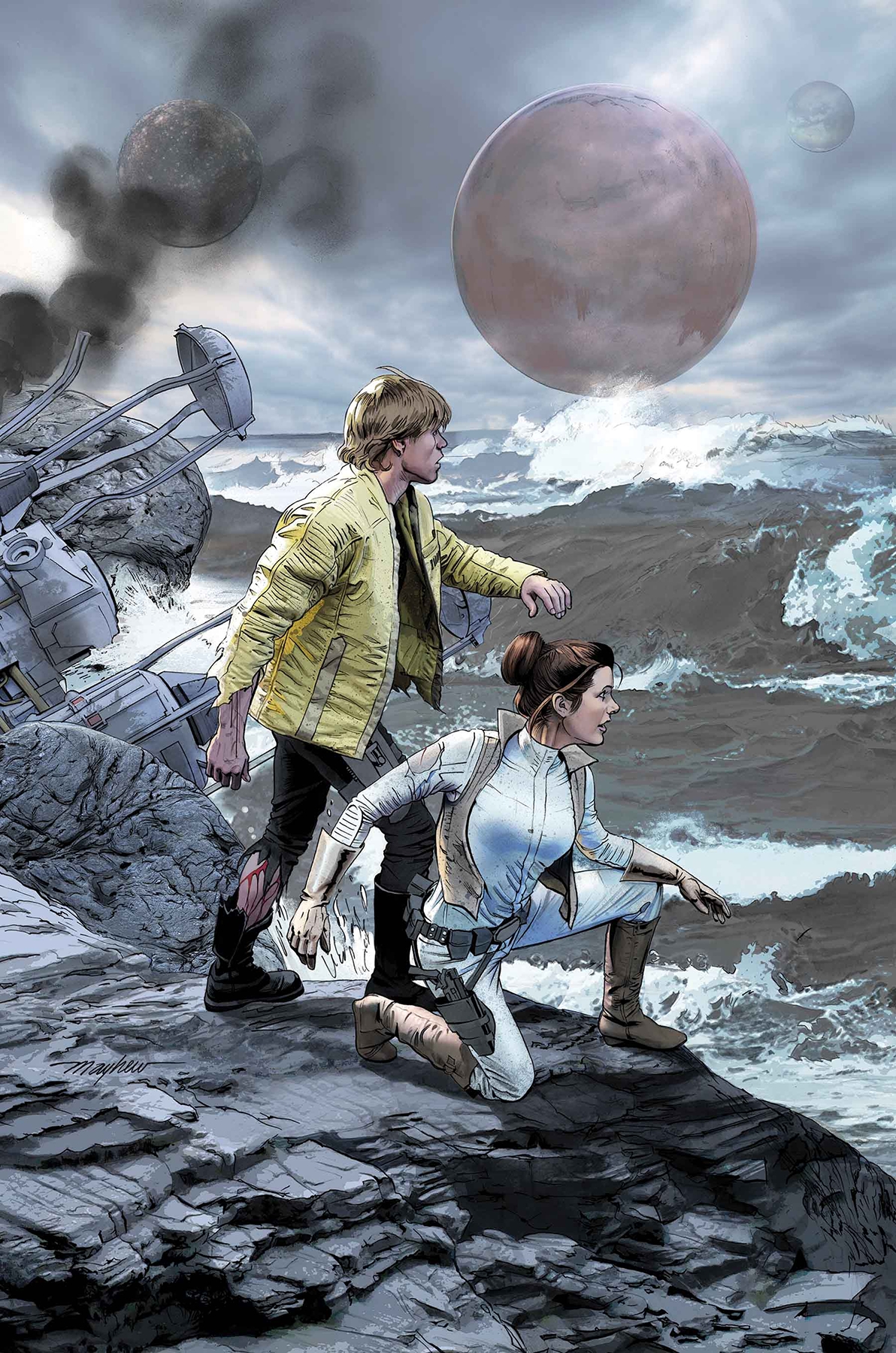
A younger generation sought to stop Imperial tyranny and restore the Republic.
When Organa escaped with the help of Obi-Wan Kenobi and his crew to Yavin 4, the station pursued them. Mon Mothma decided to travel to Coruscant to surrender to the Empire in the event of Yavin 4's annihilation, willing to publicly disavow the Alliance and her life's work in the hope of sparing other worlds from incuring the Empire's wrath. Instead, at the Battle of Yavin, Tarkin and many of the Joint Chiefs perished aboard the Death Star when it was destroyed by rebel pilots. Mothma contemplated that as the news of hope spread throughout the galaxy, more young rebels who did not know democracy, regret, or a lover's kiss would rally to the revolution and die by her command.
Clan Markona of Hubin lived largely in isolation and paid tithes to the Empire, which left the community alone as it did not seek Hubin's limited little resources. The clan leader had lived through the collapse of democracy and retired after lending assistance to Imperial forces, believing that there was no clear line of distinction between the end of the Republic and the Empire's beginning. The Markona were initially satisfied with their isolation, but they were inspired by the defiance of the Heroes of Yavin and became rebels against the Empire.
To counter the Empire's claims that her rebels were anarchists and terrorists who sought to destroy the galaxy, Mothma wrote the Declaration of Rebellion based on the language of law. The declaration recognized the need for a "Galactic Government" with jurisdiction over all beings who must give up "certain rights and freedoms" to ensure harmony between everyone. Such "power and right to rule" derived from "the consent of the governed" and that "free beings" had the "unalienable right" and "duty" to change a government with a sustained history of "willfully and malignantly" usurping their rights.
The Alliance decried the Empire's abuses, namely the disbandment of the Senate; a policy of human-centric speciesism and genocide; the replacement of member worlds' chosen leaders with moffs and governors; the raising of taxes "without the consent of those taxed;" imposing legal punishments such as imprisonment and the death penalty without trial; "unlawfully" taking "land and property;" and excess military expansion for the "sole purpose" of oppression. Refusing "any Imperial law contrary to the rights of free beings," the beings of the Rebel Alliance therefore pledged their property, honor, and lives to destroy the Emperor and his Empire and "make forever free all beings in the galaxy."
One of the Heroes of Yavin was Padmé Amidala's son, Luke Skywalker, who trained as a Jedi while supporting the Rebellion. At the Battle of Endor in 4 ABY, Skywalker inspired the conscience within Darth Vader, who reclaimed his role as the Jedi Anakin Skywalker and turned against Emperor Palpatine, killing the Dark Lord in an act of self-sacrifice for his son. Loyal Imperial forces heeded Palpatine's posthumous instruction to initiate Operation: Cinder, devestating selected worlds such as the Emperor's homeworld of Naboo.
Padmé Amidala's handmaiden Saché had joined Naboo's legislative assembly due to her heroism during the Trade Federation invasion of Naboo and been a favorite to be elected as the world's governor, but the newly founded Empire had instead installed Moff Quarsh Panaka, rendering the monarchy as a figurehead. However, Queen Sosha Soruna joined Leia Organa and other rebels in repelling Imperial forces over Naboo twenty days following the Battle of Endor. As the Rebel Alliance reorganized itself as the New Republic, Naboo became a member of the new democracy, and the Empire shattered into various political and military remnants by the end of the Galactic Civil War at the Battle of Jakku in 5 ABY. Some worlds chose not to join the New Republic and remained neutral, such as Ryloth, whose freedom fighters had their hard-won independence. The Narquois people sued their Neimoidian neighbors for imposing hundreds of years of serfdom on them, with the New Republic courts handling unprecedented levels of compensation claims.
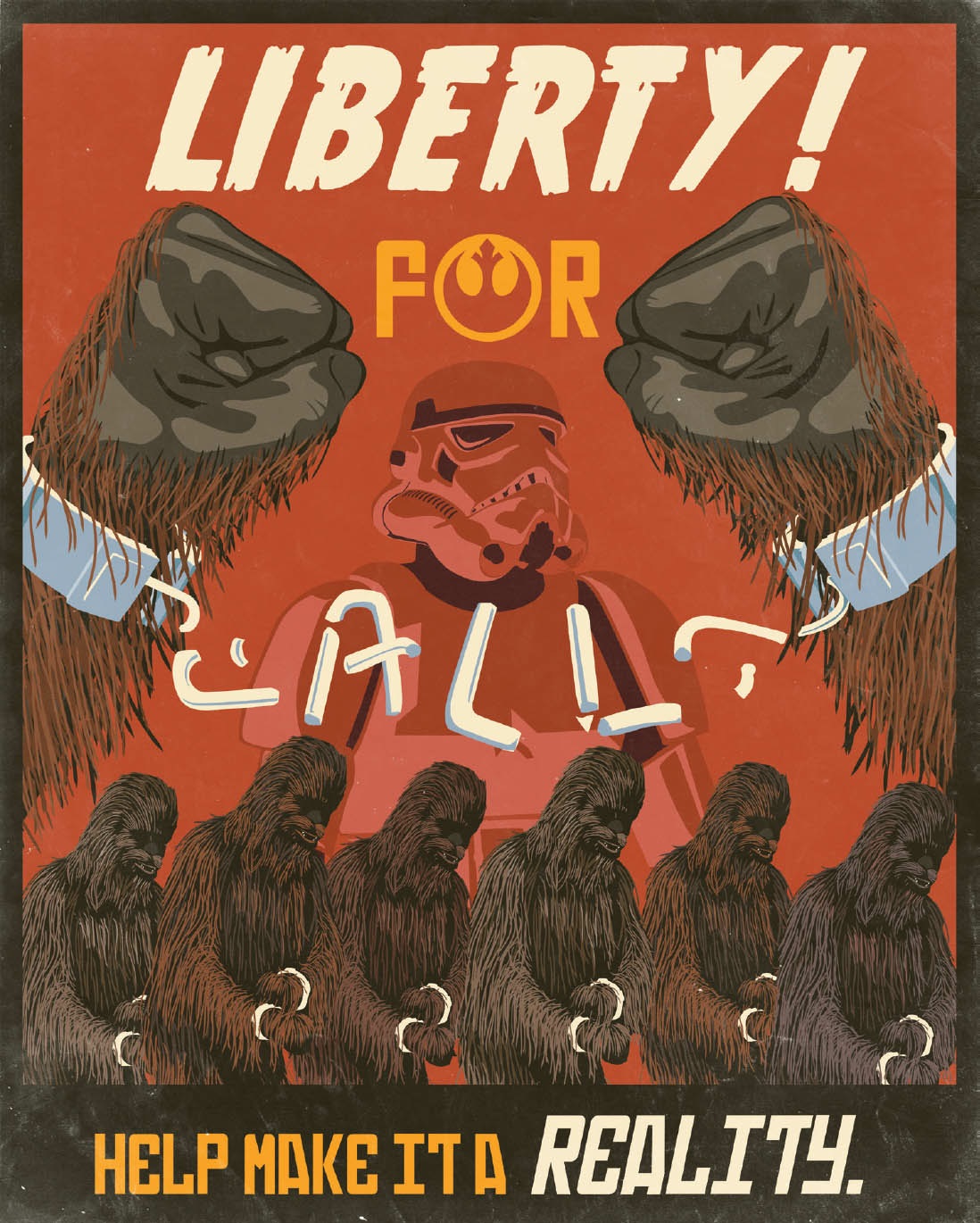
Liberty for All, a poster calling on the freedom-loving people of the galaxy to break the chains of Imperial oppression
Mon Mothma served as the Chancellor of the New Republic, reviving democracy with the restoration of the Galactic Senate on Chandrila. Mothma's public relations representative, Olia Choko, gave an interview in which she was assaulted by a fruit thrown by Geeska Dotalo. The disgruntled citizen spoke of his homeworld, Gan Moradir, being embroiled in chaos and famine due to the war, and Choko encouraged Dotalo to serve as his world's representative in the Senate. Choko then chastised a New Republic officer nearby for parading captured Imperial soldiers, stating that the New Republic should not replicate the demeaning acts of the Empire; she believed that mistakes were inevitable in a democracy, which relied on listening to and learning from everyone to survive and thrive.
Under the Duchess and Captain Bombardier, the royal family of Plazir-15 transformed itself into an elective monarchy leading a direct democracy following the Empire's collapse; Plazir-15's charter affirmed the world's pacifism and pluralism, with citizens directly involved in decision-making and choosing to be independent of the New Republic. Around 9 ABY, a tannoy announcement on Plazir-15 declared that it was the only remaining direct democracy in the Outer Rim.
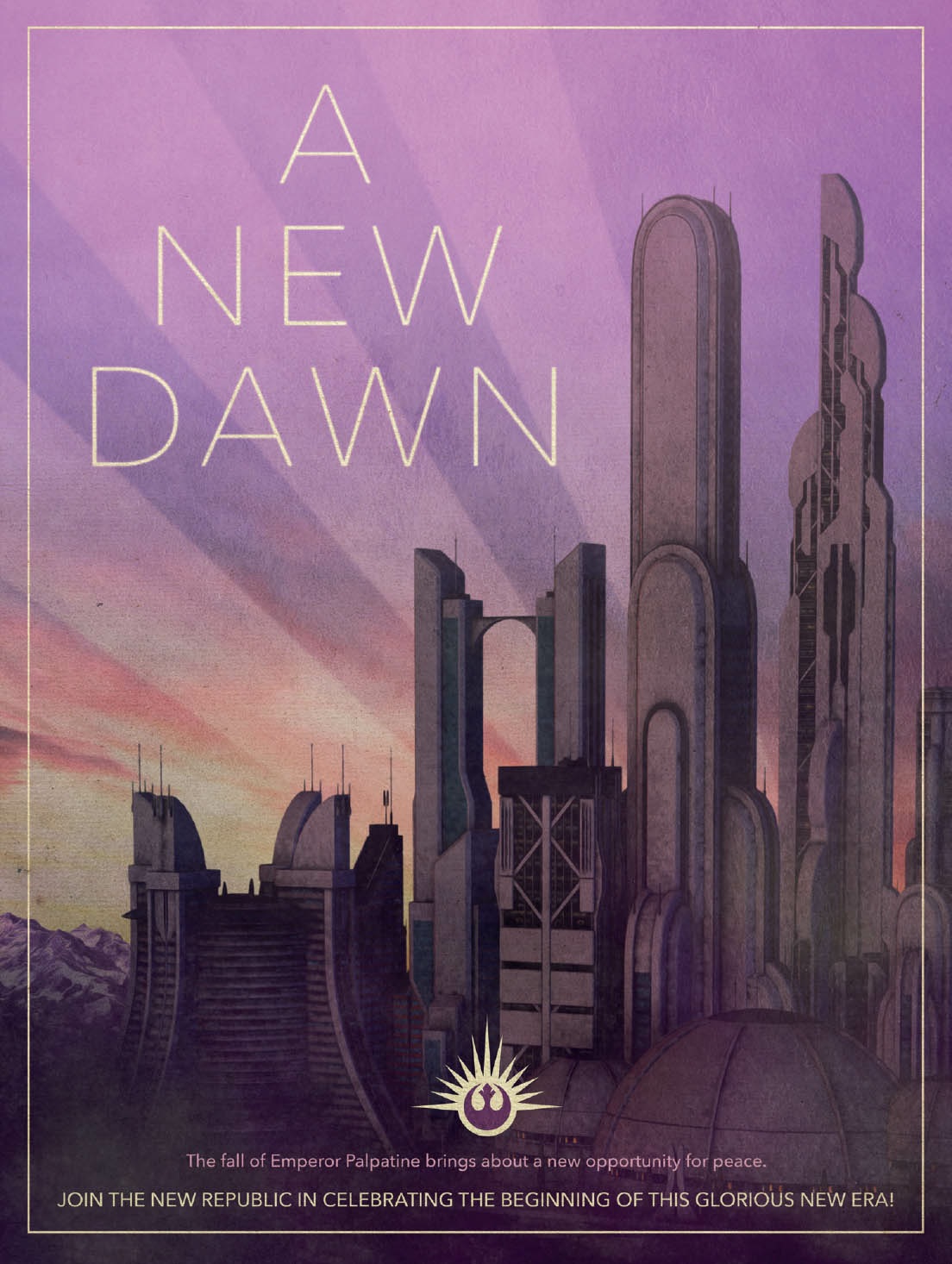
A New Dawn, celebrating the restoration of democracy on Chandrila, the first capital of the New Republic.
Not all inhabitants of the galaxy were swayed back to democracy. The First Order was a fascist junta formed from Imperial remnants hiding in the Unknown Regions that aimed to revive the Empire's false glories. It took advantage of the New Republic's demilitarization under Mon Mothma to strengthen a technologically advanced military; despite the New Republic's arms manufacturing restrictions, major arms corporations such as Sienar Fleet Systems and Kuat Drive Yards created subsidiaries such as Sienar-Jaemus Fleet Systems and Kuat-Entralla Drive Yards operating outside the New Republic's boundaries to supply the First Order. The crime lord Rinnrivin Di raided trade lanes around Ryloth, and Senator Leia Organa uncovered that his cartel was funded by the Amaxine warriors, who were agents of the First Order. The Senate was unwilling to take action, prompting Organa to set up a paramilitary force named the Resistance in 28 ABY.
In 29 ABY, a majority of systems aligned with the Centrist movement seceded from the New Republic and publicly joined the First Order. The move was welcomed by the Senate, which had been suffering from political gridlock between the Centrists who favored centralizing executive power and the opposing Populists, but Cold War tensions surfaced as the Order made incursions in the Trans-Hydian Borderlands.
Rebel veteran Amilyn Holdo gathered evidence that the New Republic Defense Force was intentionally taking no action regarding the First Order's growth. Indeed, the New Republic simply voiced opposition to the First Order's blockade of the Otomok system to extract ore from the world Hays Minor, where weapons were tested and children were stolen to bolster the Order's secret stormtrooper program, but accepted the Order's claim that it was an internal affair.
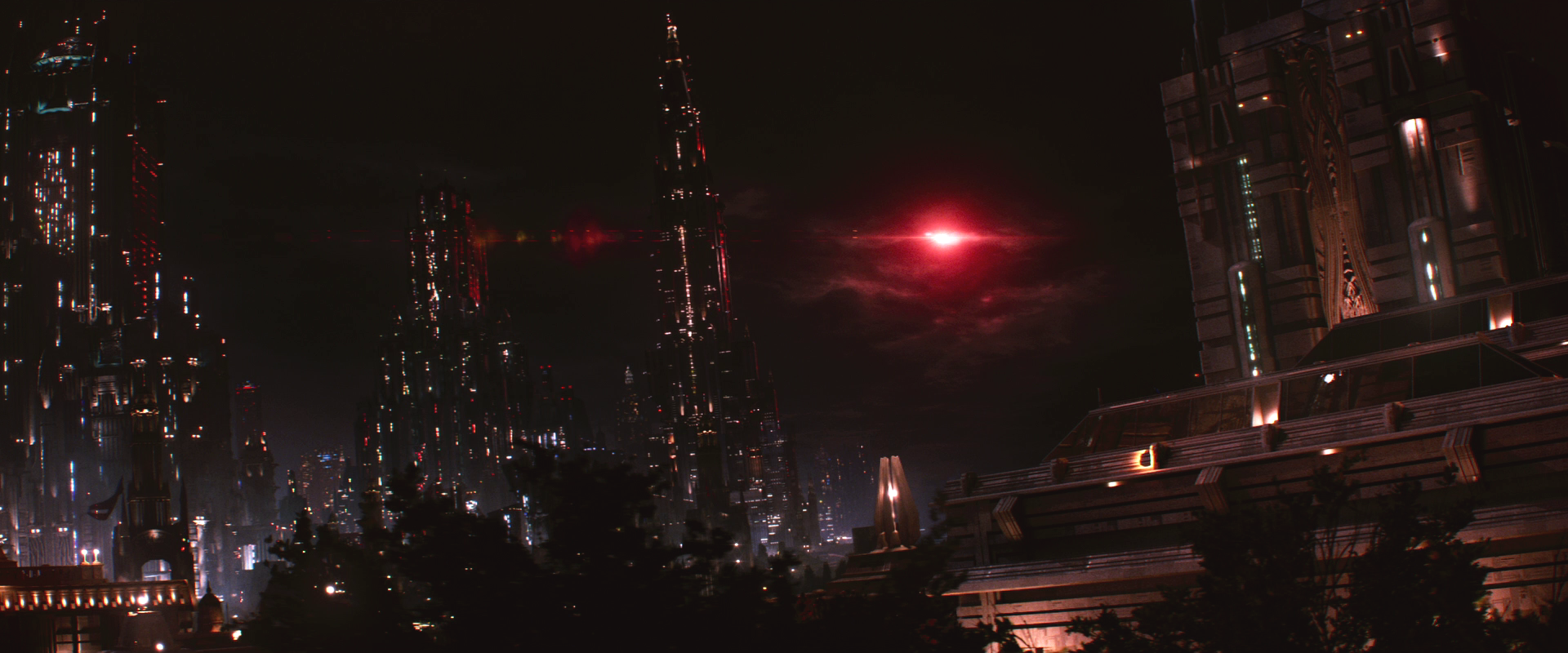
Warnings of the First Order's rise were ignored by the New Republic on Hosnian Prime—its last capital—until it was too late.
Chancellor Lanever Villecham promoted New Republic trade with the neutral systems of the Trans-Hydian Borderlands with the First Order instead of heeding Leia Organa's warnings of the fascists' military build-up; while the Senate tolerated the Resistance's activities, the Senate Intelligence Committee had dismissed evidence of the First Order's activities as insignificant to warrant action. In 34 ABY, Resistance Vice Admiral Holdo led a campaign against the First Order's pirate proxies in the Borderlands' Cassander sector without directly engaging the Order's forces.
Later that year, the Hosnian system, which housed the New Republic capital and the bulk of its fleet, was obliterated by the First Order with a single strike from their Unknown Regions superweapon, Starkiller Base. The Order then proceeded to conquer much of the galaxy despite the Resistance destroying Starkiller Base, whittling down the main Resistance fleet to a single starship—the Millennium Falcon—in a brutal war.
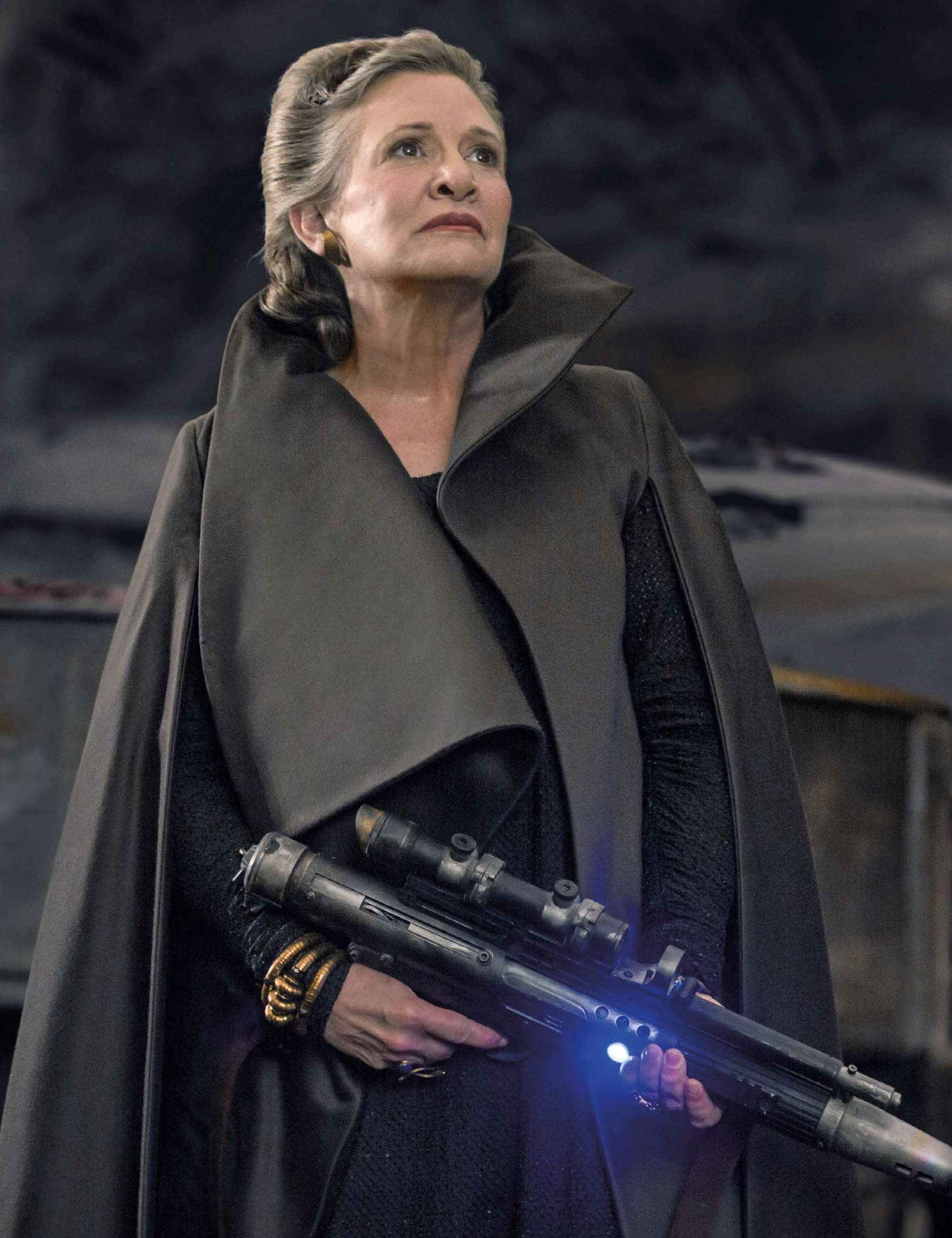
Leia Organa served as a fighter for democracy in both politics and the battlefield.
The Resistance comprised not only of Rebel Alliance veterans but those who found friendship among each other in face of the First Order's aggression—such as the aspiring Jedi Rey, the defected stormtrooper Finn, the pilot leader Poe Dameron, and the mechanic Rose Tico. Although the Resistance sent pleas for help to their allies across the galaxy at their most desperate hour, none responded. The galaxy's wealthiest citizens profiteered from collaboration with the First Order and the sale of machines of war, living luxuriously in places such as Canto Bight. However, stories of heroism, such as Amilyn Holdo's sacrifice against the First Order fleet and Luke Skywalker's standoff against a First Order Army began to inspire rebels with hope across the galaxy.
Ikkrukk was among the hundreds of worlds invaded by the First Order. Although the Resistance defeated the First Order forces that were destroying Grail City, Prime Minister Grist was unwilling to lend further support for fear of First Order retaliation, and some members of her government cabinet were even sympathetic to the new regime and hoped that occupation would benefit the city financially. Later, the Resistance was temporarily sheltered by the Ryloth Defense Authority militia, but Chancellor Drelomon's Rylothian government was worried that the Resistance's presence would draw the destructive wrath of the First Order. On Akiva, which had been the first planet in the Outer Rim to join the New Republic, voters removed the incumbent governor in an emergency election in favor of a First Order–affiliated merchant.
The First Order blockaded Ryloth to demand tithes anyway, oblivious to the Resistance's presence. General Organa promised the RDA leader, Yendor Brethen, that she would not ask him to fight his relucatant government or people. However, the government betrayed the RDA, whose base was attacked by the First Order, yet the Resistance had taken the time to re-gather its forces and evacuate. The group also stole a list of rebel veterans from First Order–occupied Corellia, intending to recruit them to the cause. The Tah'Nuhna civilization, who remained neutral in conflicts from the Hundred-Year Darkness to the rise and fall of the Empire, were later destroyed by the First Order for briefly providing refuge for the Resistance.
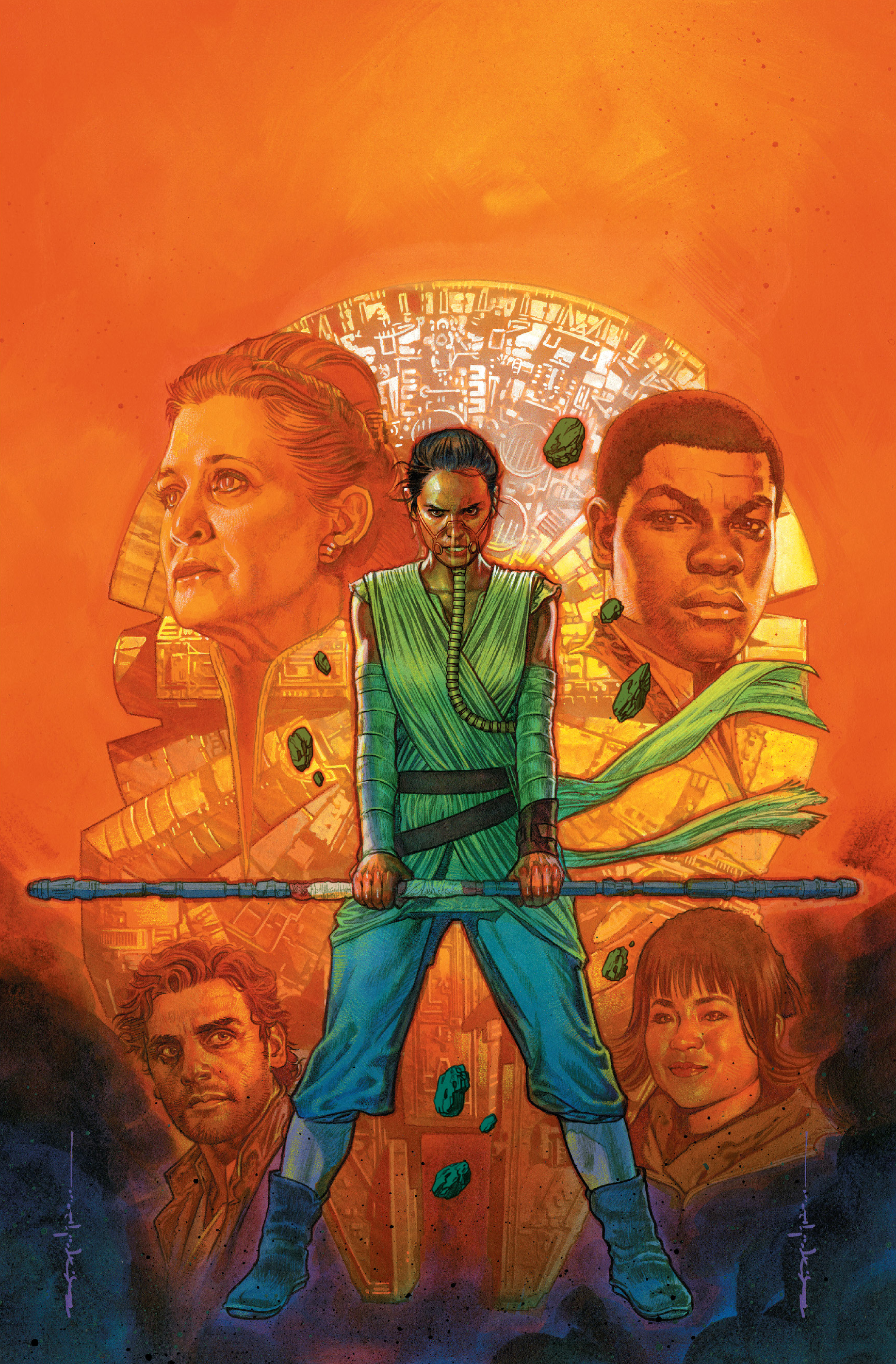
The Resistance was not only led by General Organa but bound by friendship among its fighters.
Spurred by the collective punishment of the Tah'Nuhna, the Resistance sought the support of the Mon Cala fleet, pleading King Ech-Char to support their cause. Ech-Char wanted to protect his people from First Order retaliation and refused to support the Resistance, and he also chaired the Mon Cala court with the support of isolationist Quarren advisors to order General Organa's group to leave the world. When the First Order arrived, the veteran Quarren leader Nossor Ri sacrificed himself to allow the Resistance to leave the planet alongside Aftab Ackbar's Mon Cala fleet.
The Resistance subsequently relocated to the secluded world of Ajan Kloss. Palpatine was then resurrected due to a combination of the cloning efforts of his Sith Eternal cult on Exegol and the dark side of the Force, which was concentrated on the Sith throneworld. The Emperor attempted to create a Final Order that incorporated the First Order's forces in 35 ABY, but they were thwarted by the Resistance, who gained support from Company 77—a group of former stormtroopers who had deserted the First Order after refusing to carry out an order to fire upon civilians.
Democracy and freedom were restored following the Battle of Exegol. Rebel veteran Lando Calrissian assembled a fleet comprised of volunteer citizens from throughout the galaxy, heeding the call of the late Leia Organa to help the Resistance movement and the Jedi Rey in defeating the Sith once and for all. Citizens of the galaxy then led spontaneous uprisings across the galaxy, burning down the First Order.

Lucas compared the Ewoks that defeated the Empire to the Vietnamese that defeated the "American Empire."
Democracy is a global value in the real-world commonly associated with liberal democracies' systems of governance that include respect for individual human rights, the rule of law, the separation of executive, legislative, and judicial powers, and free and fair elections. Having been working with his filmmaker friend Francis Ford Coppola on Apocalypse Now, a film about the United States' then-ongoing war in Vietnam that was eventually released in 1979, George Lucas wrote a rough draft of Star Wars in 1974. He describes the Empire as "America ten years from now," at a "turning point" of "fascism or revolution." "Nixonian gangsters"—referring to the incumbent American President Richard Nixon—would have assassinated the Emperor and rigged an election to take power, starting race riots and helping rebel groups before imposing a "'total control' police state" welcomed by the people who are frustrated with rampant criminality. The completed film, 1977's Star Wars: Episode IV A New Hope, was originally simply titled Star Wars and launches the original trilogy with an Empire inspired by what Lucas describes as the "American Empire," coupled with the fascism of Nazi Germany between 1933 and 1945. Lucas also compared the rebels and Ewoks' battle against the technologically advanced Imperial forces in 1983's Star Wars: Episode VI Return of the Jedi with two cases of the "underdogs" against the "empire"—firstly, the "Viet Cong" that defeated American forces in the Vietnam War, and secondly, the founders of the United States that defeated the "English Empire" in America in the late eighteenth century.
Lucas created the prequel trilogy to explore how democracies could be eroded and transition into dictatorships through democratic means rather than via coups or rebellions in the real world, paralleled with the story of a good person such as Anakin Skywalker turning into a villain—Darth Vader. In retrospect, Lucas described himself as a lifelong believer in democracy and America, and he explained the original trilogy as being the story of "Princess Leia and her friends" waking up to the fact that the Republic was the Empire, a "sham" democracy that they must resist. Lucas acknowledged that the prequel trilogy's tale of democracy's collapse, ending with the release of Star Wars: Episode III Revenge of the Sith in 2005, is comparable to the United States' then-ongoing war in Iraq, and he also compared Anakin Skywalker to incumbent President George W. Bush and his master, Emperor Palpatine, to his Vice President Dick Cheney.
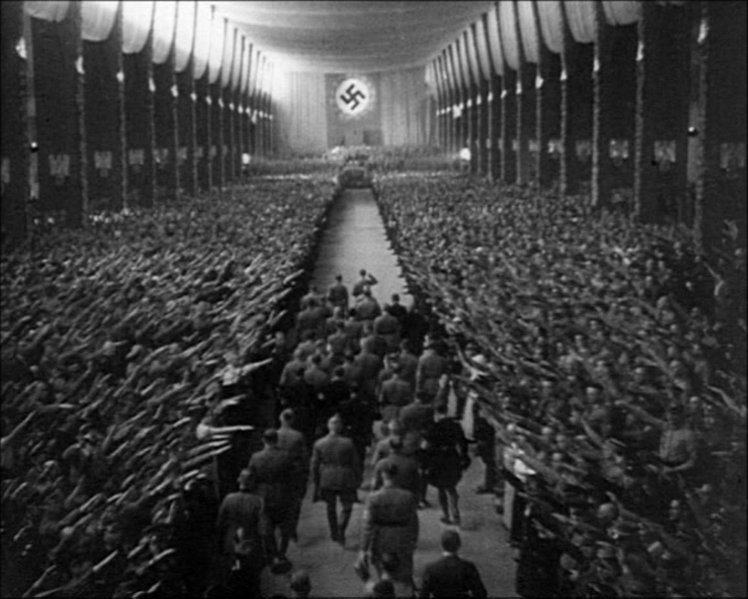
Lucas worried for America's democracy, drawing on historical examples of dictators being voted into power when making Star Wars.
However, Lucas clarified that he had written the prequel story during the Vietnam War, with concerns about the Kennedy family and President Nixon and his worry that democracy in America is vulnerable: he believed that politicians' inefficiency prompts voters to elect charismatic "tyrants" who promised to "get the job done." Furthermore, though American politics during the Vietnam War served as a catalyst for writing Star Wars, the film director had in mind a more universal exploration of the underpinnings of human society. Lucas cited Julius Caesar and Augustus in the Roman Republic, Napoleon Bonaparte in revolutionary France, and Adolf Hitler in the German Weimar Republic as examples of the cyclical nature of history.
J.J. Abrams and Lawrence Kasdan wrote the story of the 2015 sequel trilogy film, Star Wars: Episode VII The Force Awakens, based on the existing Star Wars setting and characters as part of Lucas' tale of hope against the backdrop of cynicism following the Vietnam War. Abrams and Kasdan, the latter of whom also worked on the scripts of the original trilogy, therefore extended the story of "light versus dark" and good against evil rather than make real-world geopolitical or social allegories, though Abrams acknowledged that the rise of the First Order against a benevolent New Republic could be comparable to forces happening then in the real-world. Likewise, director Gareth Edwards of the 2016 anthology film, Rogue One: A Star Wars Story, clarified that the story was written in mid-2014 when asked whether it is significant to "recent political events" in December, 2016. Edwards also echoed Lucas' belief that storytelling reflects a "human condition" that remains constant throghout human history; a "timeless" saga such as Star Wars would always resonate with contemporary events given Edward's belief that humanity is a cycle of revolution against someone in power deemed to be corrupt. The Disney+ series Ahsoka would directly tackle the question of history repeating in cycles through the character of Baylan Skoll, who feared that history "repeats again, and again, and again" in an "inevitable" circle if not stopped.

Star Wars creators carried on the idea that stories have a universal power beyond allegories.
Director Rian Johnson of the 2017 sequel film, Star Wars: Episode VIII The Last Jedi, similarly spoke of Star Wars films as never being consciously "conceived as a political allegory," instead having a universal and archetypal power that has the effect of audiences applying Lucas' original works on current political situations. In 2018, Star Wars: The Clone Wars Supervising Director and Star Wars Rebels Executive Producer Dave Filoni—who would go onto showrun Ahsoka—discussed politics and evil as a complex matter, comparing the real world's history of democracies collapsing into dictatorships with how a beautiful tree could rot from within and thus, in Star Wars, making everyone a pawn of Palpatine "even without the Empire." Filoni said that the theme of Star Wars is in Luke Skywalker's message—to "not to be of yourself but to be selfless," finding enlightenment and then inspiring others to act too.
- Star Wars: The Rebel Files
- Star Wars Bust Collection 1
- Dawn of Rebellion
- Ultimate Star Wars, New Edition